#and put them on equivalent narrative footing
Explore tagged Tumblr posts
Text
i’m going to need more time to digest everything that happened to geralt in crossroads
geralt walked directly into a wolf trap (yes. a wolf trap. you know. the kind with teeth) and got his ass beat to horrific, actually horrible proportions, barely surviving, he spent months in the hospital—i mean temple—where he was entirely bedridden and afterwards could not even look at where he had laid because it filled him with such dread
has this man’s life just been one entire incredibly traumatizing agony and lethal injury. i mean c’est la vie du sorceleur, but my god.
the worst part of all of this is that it’s entirely plausible and everything that happened in this novel pretty much fits geralt in the saga for his neutrality and caution of revenge. but wow uh. i mean kaer morhen bruises them all pretty badly and young witchers are no strangers to pain, but geralt basically stepped one foot out of that stronghold and got bitten, beaten, chomped, sliced, diced, and his ass kicked six ways from sunday. and he was still 18
the more i think about it, i think this is the male equivalent of all the horrors which were inflicted upon ciri.
insert larger conversation here about how, in sf/fantasy especially, inflicting The Horrors onto female characters typically = SA/pregnancy, whereas male characters don’t endure those topics nearly as often. and i would say as much as i like the “all power in the hands of women” epicness that andrzej sapkowski is usually on, how he treats male characters who are SAed, or rather, are SAed but in the narrative it’s sloughed away easily like dead skin, is probably one of his worst approaches to a serious subject and a bone i have to pick. … but anyhow
that is all to say: that probably the only worse thing that could have happened to geralt would have been SA, but since that is often saved for the women in sapkowski’s novels, this is actually as low as it could have gotten for him.
because, Grevious Bodily Injury, so grevious that it’s not only incredibly painful, but disabling, which is emasculating… interesting to think about it from this lens.
what geralt got put through here was worse than what vilgefortz did to him, which is saying something. and the agonizing and humiliating feeling of that was detailed more here too, the recovery process, rather than being shown through dandelion’s and milva’s eyes.
geralt really is this guy that just exists to get fucked up so bad and that’s the story
10 notes
·
View notes
Note
please elaborate on how Donna fundamentally changed the structure and DNA of doctor who. take no prisoners. i have to know more. I think i know how you feel but i can't articulate it. Donna was the first companion to actually have significant plot relevance. Like, series 4 depended on Donna's decisions to function as a story and no other series until series 4 relied on its companion the way Doctor Who relied on Donna (Amy Clara and Bill excluded, but you could argue that's because of Donna setting the foundation). Or how the entire bit with Clara is such a cruelly ironic thing to put 12 through because it mirrors Donna's fate so well. but there's more. Donna was a massive catalyst for so much of post-series 4 doctor who but i can't articulate it. Your point about Catherine and David hitting it off as actors with unparalleled chemistry has so much to do with it too, i think.
i know there's more.
ok ok ok so this isn't going to be even slightly cohesive because like. I don't think she changed the series in a way that I can point to and be like "Nuwho used to be this and then Donna happened and then immediately Nuwho became That" but I think she did massively influence some of the directions the show went for overall.
I mean the most obvious way she changed the show is that she changed The Doctor, so like yeah if you change the central character of the show. In a lot of ways, Nuwho is very much a war story. And I think in the first three seasons The Doctor feels more like a General- a leader of the army, the one who knows what's happening and where to direct people and how to shift the tides. He is the Central Figure of the war.
And then Donna's season happens, and to me he starts feeling like more like a foot solider, or perhaps more accurately, a floor nurse. Donna very much grounds him in the people around him, he feels less, well, alien. The message that he is not there to always be the Grand Savior of the Universe or the Grand Warrior of Time, but to be on the ground and help the people that he can. And this very much carries through the rest of Doctor Who despite Moffat's best efforts, I mean yeah 12 literally says as much in the show. So there's a big ol change.
I think the second way she changed the show was due to a:Catherine Tate's comedic background and b: Catherine and David being those two friends that cannot stop being Sillay around each other is that I think she did allow the show to take on more comedic elements/ allow The Doctor and The Companion to have more FUN on screen. That's not to say that Rose and Martha never have fun with The Doctor because that's straight up not true but I think Ten and Donna have probably the highest fun per adventure ratio of any pairing and it doesn't ever feel like. Oh why are they having this fun on screen yknow?
The third big shift that I think Donna had on the series as a whole was the role of the Companion(s). Again not that Martha or Rose had ever been like. Inferior to The Doctor but to me Donna is the companion that feels the most narratively equivalent to him. The companion has always served as audience surrogate: the one to be like hey. what?? and get things explained to them for the benefit of the viewers at home. And this also happens with Donna but sometimes she's also the one doing the explaining to The Doctor! I mean, it's the soulmatism of it all, right? While The Doctor is always The Doctor as a character, Ten and Donna swap back and forth in who is taking on The Companion and The Doctor as functional roles in the story. And this was before she Literally Became The DoctorDonna like long before that happens the best way I can describe it is like. There's a podcast i've been listening to where they talk about the most "doctory" moment of the episode and tbqh a lot of times it's like "well really the most doctory moment was done by Donna" (i think her realizing that by the ood having their brains in their hands they HAVE to trust everyone is like the Peak example of this). We see this sort of thing carry on (Especially with Clara, but fascinatingly enough it's in like. a negative way bc she's sooo like the doctor but in a way that makes both of them worse) through the series in a way I don't think would've happened if Donna's season wasn't there.
And then lastly I mean she came, she served for three episodes, and she changed the structure of the show AGAIN by doing something that no companion has ever been able to do: she was able to pull The Doctor OUT of the narrative. The Doctor is like SUCH a doomed by the narrative (and by the way the show works in general) character and she said Nope! I am going to kick the narrative in the shins until I save my best friend actually <3. And then she did!!!! Holy fuck!! I know these specials JUST came out so we haven't seen all the ripple effects yet but there's no WAY that won't result in a fundamental shift of Doctor Who overall. Like 15's personality feels so unburdened in a way that has never been possible before this point. I'm so excited.
Anyway TLDR Donna changed the show by being a friend and an equal in a way that hadn't really been part of the Companion role before and she fucks so so severely <3
65 notes
·
View notes
Text
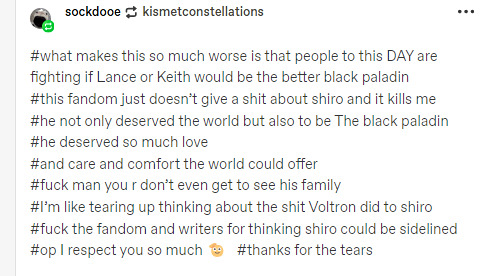
@sockdooe Are there legitimately, truly, and genuinely people who fight about that?
I'm pretty sure that the Black Lion, herself, definitively answered that question.
She came to Shiro's aid by awakening and allowing Keith to pilot her when Shiro was being attacked and on the verge of losing his life to those raptor creatures in the second season's opening episode.
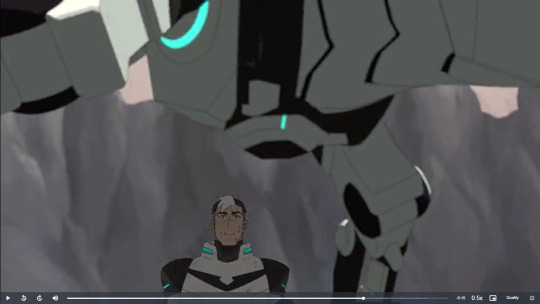
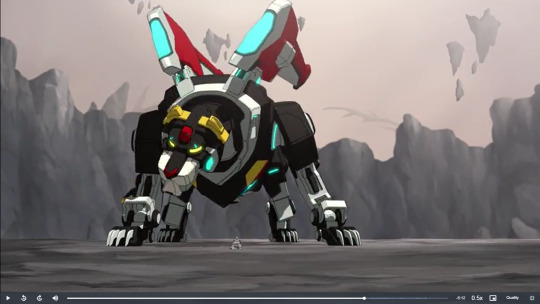
She severed Zarkon's connection to her in favor of bolstering her bond with Shiro, because Shiro understood that the relationship between Lion and Paladin is "not about power. It's about earning each other's trust."
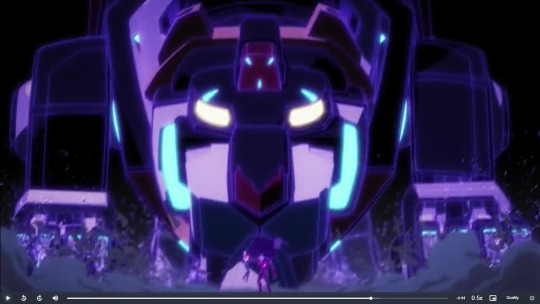
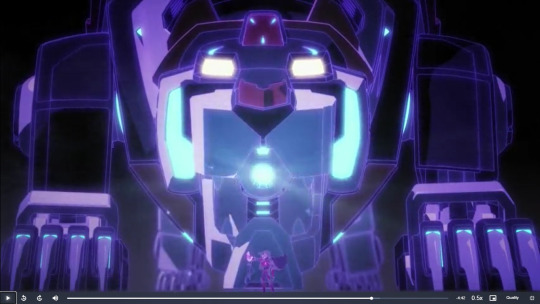
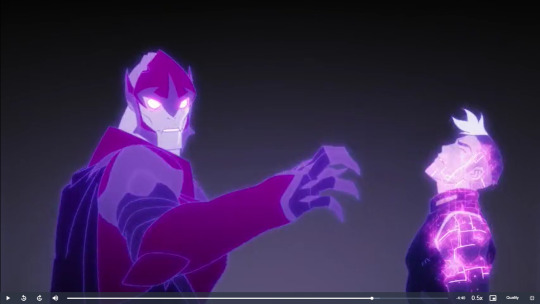
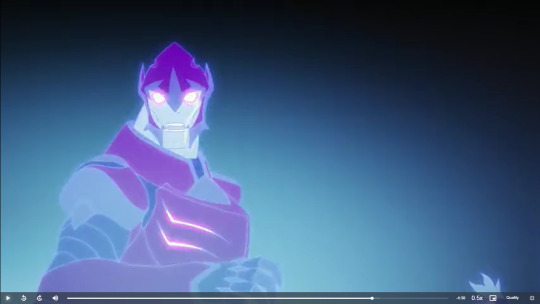
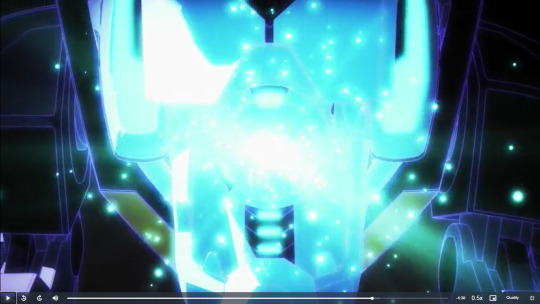
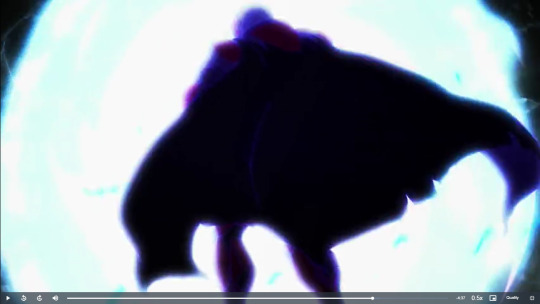
And, she cherished Shiro enough to hold onto his essence after his body was destroyed.
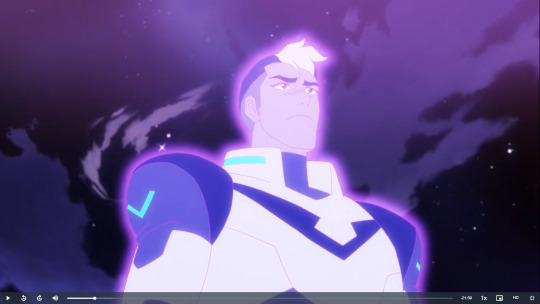
Shiro was the first to master seeing through his lion's eyes, all the way back in Season One.
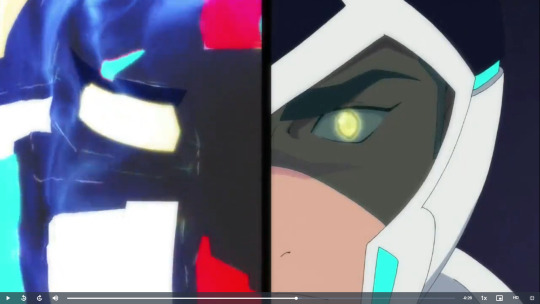
He and Black had a deep enough desire and willingness to fully understand one another that she showed him her history and abilities that she and Shiro had yet to unlock together.
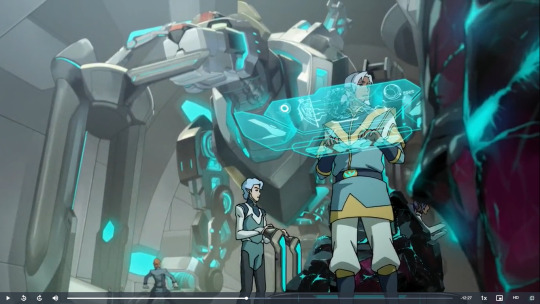
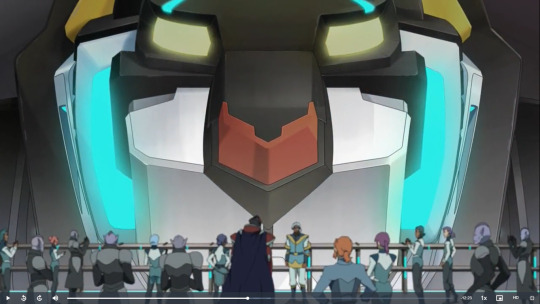
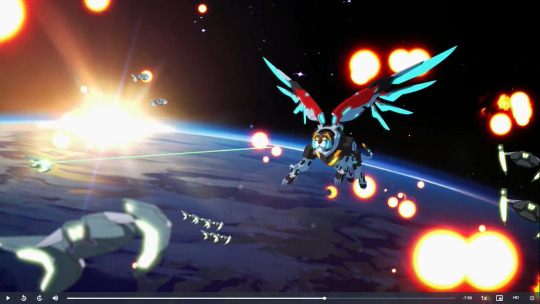
There's no debate to be had, here. Shiro is the ultimate Black Paladin, as determined by the Black Lion, herself.
I can only guess that there's an element of ageism, perhaps even ableism, and undoubtedly superficial vanity at play when it comes to the fandom's preference for Keith, Lance, and the pairing of the two of them that shall not be named. Keith and Lance are skinny, elfin-faced twinks with a cliche rivalry and certain vulnerabilities that appeal more to the younger demographic. Shiro is a square-jawed, six-foot-tall adult man with bulging biceps and abs of steel, and the sort of trauma that would take years to even begin processing, let alone healing from, who seems to be much more popular with the older, adult fans, and Eastern audiences. The younger, American fans took to calling Shiro a "dad", after all, despite him being twenty-five years-old; nowhere near old enough to be a father to any of the teenagers he finds himself put in charge of. I've also seen Keith/Lance shippers calling Shiro "Keith's dad", which feels vaguely racist, and arguing that Shiro "raised" Keith, which is ludicrous. It doesn't help at all that the show, itself, feeds into the ageism and ableism by sweeping Shiro's trauma under the rug, sidelining him when he's down an arm, and sequestering him and Coran off with the other adults while the teenaged- sans Keith, who was at least twenty-one throughout the latter half of the seventh and whole of the eighth season- Paladins go off on their adventures.
I know the intention was to kill Shiro off permanently before the producers vetoed it due to Shiro's popularity and status as the show's only (living, explicitly confirmed, and relevant) gay character. Perhaps because he has no one-to-one equivalent character in the original series this was a remake of, and Keith was the leader in that same original series, so he was destined to be the leader, here, as well. Or, because the VLD showrunners were under the- delusional- belief that they could have Keith redo what Shiro had already done, only better, somehow, because they prioritized spectacle over narrative substance. Regardless, it's apparent that Shiro is only still around out of obligation, come the eighth season, and there was no desire on the writers' parts to further explore or develop his character. Hence him having no family, and, by extension, no real support system, being largely isolated from everyone, only really getting to shine in an episode that's half filler and unintentionally perpetuates more ableism, and then being married off to a "character" who might as well be a glorified piece of set dressing for all of the personality and importance he's given.
It's absolutely mind-boggling to me that,
1. The majority, or at least the most vocal parts of the fanbase cared more about shipping and complaining about being "queerbaited" over Lance/Keith when Shiro is right there.
And, 2. It seems like Josh Keaton, Shiro's voice actor, was the only member of the crew who truly appreciated Shiro, enough to offer his personal headcanon about Shiro's family- that Shiro was raised by his grandfather- state that he intentionally gave the clone's voice a harder edge compared to Shiro's softer, gentler tones in order to distinguish between the two of them, showing his implicit understanding of Shiro's character, and even made a video tribute to Shiro after the show had ended.
Aww, thank you for enjoying my angry rant on Shiro's behalf. Believe me, it burns that Shiro is overlooked entirely as the stepping stone he was on the path toward gay representation in children's media, purely because this show's quality plummeted so hard, and the fandom earned itself a reputation as one of the worst in recorded history. He deserves to be honored and celebrated, as not only a proud gay man who told Pidge that "owning who you are is going to make you a better Paladin", but also as a trauma survivor who strove to remain gentle, patient, and kind, and devote his life to saving others.
And, yes, he also deserves the best therapist in the universe, and all of the cuddles. ❤
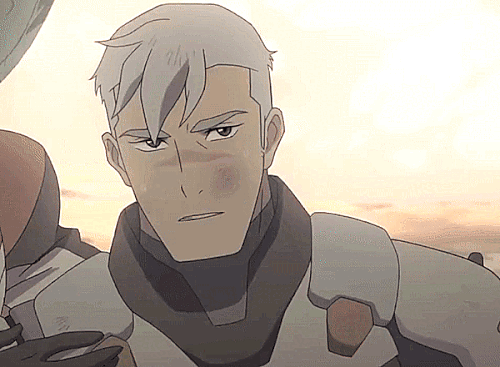
#Correspondence.#sockdooe#Takashi Shirogane#Shiro#You're nothingness but shining and everywhere at once.#Voltron: Legendary Defender#Meta.#VLD Meta.
53 notes
·
View notes
Note
A lot of these discussions about colonizer romance or slave fantasies or similar just feel like the race version of the way certain feminists keep wringing their hands about rape fantasies and the “problem” of them. Like, sure, there are certainly people in the “privileged” group in question who enjoy those in the more “problematic” way that might speak to something concerning about how they view any real-life partners or sex (“might” being a key word here)… for instance, the slavery isekai anime trend seems to be most popular with gross dudes who really do think having a slave woman who waits on you hand and foot and also has sex with you is desirable and wish they could have that irl. But I think the bigger reason these “problematic” fantasies persist is that a lot of people in the equivalent “marginalized” group also really like it in their own ways. They like eroticizing that experience that is so troubling irl. It’s clear some of the people who like these “colonizer” romances are colonized people just as a lot of women love rape fantasies.
Idk, I don’t think the discussion is as simple as saying that what porn or romance you are into has *zero* effect on your IRL sexuality. I think it’s hard to argue that if you’re getting off to something a lot, it doesn’t impact the rest of your life in at least some way, the brain doesn’t draw firm walls around these things— and there’s just the objective fact every young straight woman I’ve known has observed that a lot of younger straight guys have had their expectations of women and sex warped by the unrealistic stuff they’re seeing in porn. But I think like with any other “how does the media affect us?” question: it’s almost never an exact 1:1. Different media deals with these topics differently, and even the same media can affect different people different ways, or even the same person different ways at different points in their life. That’s the issue with “anti”-style thinking, not that fiction can never affect real life. It’s that it’s never as simple as just making a list of bad things no one can like. One person’s trash is another’s treasure and v.v., and what can be irredeemable hateful garbage to one person can be cathartic to another. Just like how the kinks that your abuser used to justify abusing you can be used by another person as their lifeline to help them enjoy sex again after abuse. Rape fantasies or racial fantasies that may seem objectively bad when framed around how privileged people view them… well, that’s not the only framing (and maybe we should stop centering privileged people all the damn time?)
So like even aside from the fact that “colonizer romance” does not have a single objective definition and that people are putting a wide swath of stuff into that label, and it should be used as the start rather than end of a conversation… are we even sure that everyone is coming at it from the POV of the colonizer? Are more people really viewing themselves as John Smith or as Pocahontas? And so when looked at that way, isn’t it really more another version of the eternally-popular-among-women “I can change/fix him!” narrative? (Which itself can be critiqued, particularly in how often patriarchal media sells that to women and why… but that’s a different conversation from the usual “colonizer romance” conversation.)
Or maybe some people are just inherently drawn to cross-cultural romances in general, and those people also like ones that don’t have a colonizing aspect to them?
Like, there’s a lot to unpack here that isn’t in these conversations. We can’t just make this the new buzzword, thought-terminating cliche.
--
29 notes
·
View notes
Note
How would you have done bg3’s story to be less companion based, other than removing them entirely? Genuinely curious because I think I feel the same way but I can’t quite put what it is into words
i don't think it's that the game should be less companion-based, per se; i think the reason that i personally am not particularly interested in that approach as pertaining to story is that the companions' individual plotlines are thematically-resonant, but not cohesive overall. the recruitable characters rarely interact with each other or participate in each other's subplots, which weakens the main plot and makes it hard (for me, anyway) to buy the quirky found-family ensemble dynamic that the player is supposed to become invested in. interactions between party characters are contained almost entirely in ambient party banter and easy-to-miss post-cutscene dialogues with your player character, which results in the story equivalent of the player character becoming co-protagonist of six unrelated plotlines at once while the rest of the quirky found-family ensemble resolutely ignore one another. it's taking the most compelling narrative aspect of a big, colorful cast and shooting it in the foot—and the player character's dynamics with each individual party member don't make up for it, because a custom player character is not, by design, fully-fleshed. a blank slate's interactions with a character with a full backstory are not going to be thematically rich or reciprocal. the test of love at the circus cracks me up because it's completely one-sided. your turn, gale...you confessed your love to this character...if they were a food, what kind of food would they be. go on
the end result is that, even though the game is ostensibly story-driven, most of the meat of the story—insofar as it's a story about a ragtag team of misfits who become like family—is still left to the player's imagination. and that's the tradeoff of a choose-your-own-adventure plot with as many branching paths as this one...in this game you can kill or maim or dismiss a recruitable character and never see them again. it's mechanically easier to allow and accommodate for that sort of gameplay decision when that character doesn't play an important role in other characters' plotlines and development arcs. but it means that your big, charming ensemble cast is going to stand in the background staring into space while all of the important story beats happen. i'd have traded player character customization and much of the game's freedom of choice for a more linear gameplay route that accounts narratively, at all times, for each of the characters
(if anyone else wants to chat about bg3, send your asks to my bg3-centric blog at @gribbo! i like to keep things compartmentalized lol)
39 notes
·
View notes
Text
i don't care if bsd is believable. i don't care if the plot twists make sense, because honestly they never really have made much sense and they don't necessarily need to. bsd tends to be kind of ridiculous and a lot of times that's what makes it fun and endearing. i am perfectly willing to suspend my disbelief for this show.
i do care if bsd is rewarding tho, and i don't feel like this was a particularly rewarding season finale as far as dazai's character goes. another dazai ex machina ending to a season isn't the problem here for me; it's the doubt that resolution is retroactively casting on everything dazai has done and said in the last arc. it makes the sincerity of everything he said suspect. it makes me wonder if he was ever really in danger. how much dazai knew, how assured he was of his victory isn't entirely clear, but that doesn't really matter. what matters is that enough of the conflict in the mersault arc was shown to be not real, and that puts everything in a different light. it makes any vulnerability or weakness dazai showed during the arc seem inconsequential, and it makes it feel less genuine dazai's speech to chuuya when he was "drowning" chuuya was interesting when the chapter released because it had so many character and relationship implications. dazai, pragmatic and logical as he is, being capable of killing chuuya if he had to but not incapable of feeling nothing about it. it made you wonder if perhaps dazai might be doing something he'd regret, if he'd realize only once it's too late the true consequences of his actions. dazai saying for years that he wants to kill chuuya and genuinely believing that he wants him dead, only to realize once he's succeeded at that that his life is missing something without chuuya there to irritate him... that's interesting! that's opening up a whole world of possibilities for dazai's character and their relationship. even if chuuya survives, dazai still may be faced with the realization that hey, he doesn't want chuuya dead. it forces him to really reckon with the magnitude of importance chuuya has in his life, which, for all of their unspoken trust, may be something dazai has taken for granted. it might make him re-examine his feelings or himself. it might change the dynamic between them.
now that there's the possibility of it being pre-planned, that speech loses it's weight— and the character implications of it are somewhat lost. of course, there is the possibility that dazai didn't know at the time, that he only figured it out at some point during the events of the game. it's certainly open to interpretation and it's definitely interesting to interpret it that he didn't know at the time, but it's an equally valid interpretation that dazai knew all along, so it shifts the exploration of dazai's character and his feelings for chuuya from the realm of canon to fanon.
but the way that the vampire fake-out plot twist is presented does strip some of the possibility for vulnerability from dazai's words. it casts enough doubt on it to make it plausible that he was just fucking around, that it doesn't really mean anything. it keeps dazai in a secure place of superiority in the narrative and makes him immune to normal character flaws and weaknesses. dazai, as a person, is supposed to be learning to trust and he wins because of that trust, but it's falling flat for dazai as a character (for me, at least) because we don't believe there was ever really a risk that he'd fall. as the audinece, we can see asagiri setting up a safety net and it negates the impact of the trust fall that dazai is supposedly doing. basically this plot twist is the emotional equivalent to seeing a video of someone jumping off a ledge and then the camera zooms out and you realize what you thought was a 30 foot drop is actually only about 3 feet. and not only is it not rewarding, but it makes me feel like i was silly for being worried in the first place.
#sliding asagiri a 5 dollar bill. can you write dazai like yuo did in dark era/beast au again. i miss that dazai#i think the idea of skk doing a vampire fake-out plan is funny and on brand for them it's just that it's a disappointing revelation#after everything this arc seemed like it was setting up#ill be interested to see if the manga and anime are gonna diverge now?#i have a fever i dont know how coherent this is sorry#obligatory text post tag#bsd
20 notes
·
View notes
Text
Higurashi: Festival Accompanying Chapter 13
At this point, we already know everything leading up to June 1982, so the chapter is more focused on the reactions to it rather than the event itself.
We start the chapter off with Tamae Hojo already dead and jump forward a few days. And Shion ended up being correct; Satoshi did buy that giant teddy bear with the money he'd earned.
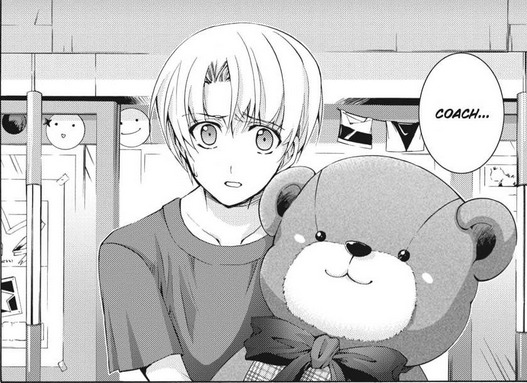
I've been waiting since Curse-Killing to bring this up and now is the perfect moment to do so: Throughout this entire series, Satoshi has never actually been confirmed to have murdered his aunt. Each arc it comes up, the narrative would come closer and closer to accepting that as true, but we never actually saw it ourselves.
In Abducted by Demons, Tamae's murder and Satoshi's disappearance are treated as unrelated events that were part of the series of murders and disappearances. In Curse-Killing, the possibility that Satoshi killed Tamae was first proposed. In Eye Opening, we saw the build-up leading to the murder and the immediate aftermath, but not the murder itself. In Atonement, Rena outright says Satoshi killed Tamae.
And now we have Irie thinking about Satoshi's condition and he just accepts that Satoshi most likely killed his aunt to protect his sister. And just like with the 1980 case, Irie's perspective asks that we not point fingers and accuse Satoshi. His actions were due to stress and desperation, and he would never have done anything like this if he were in a better state of mind. We don't get to see the actual murder because that would be equivalent to actually blaming Satoshi for the murder.
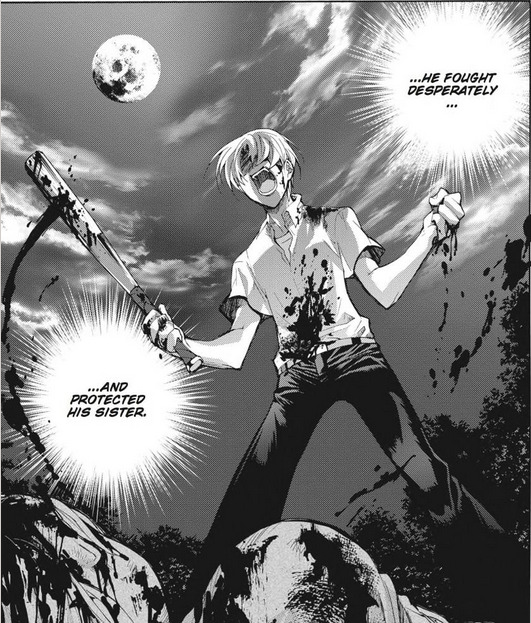
I think it's worth noting that the actual confirmation that Satoshi killed his aunt comes from his own mouth. While he's panicking thinking that every person in town is his aunt, he openly states he beat her with a bat until she was dead.
When Satoshi started scratching at his throat, he asked if there are maggots in his blood, which calls back to Rena's mental state when she started to suffer from Hinamizawa Syndrome in Atonement. This actually really shows how much of a miracle case Rena is. She likely was on the verge of L5 syndrome when she was little but was able to be pulled back from the brink, most likely with the help of sedatives and various medications. But she never actually recovered which explains the random outbursts she'd have throughout the series.
And during Atonement, she relapsed into a near L5 state once again and came back from it once more because Keiichi refused to give up on her and make her believe her friends really are there for her. And she hasn't had any relapse since, not even across timelines.
So I guess beyond just medication, it's important that victims of Hinamizawa Syndrome need to feel like they're secure within their communities and can rely on them for help. I mentioned way early in the series that I think part of the festival's purpose is to reinforce the sense of community within the village. Each murder that wasn't part of Takano's machinations was committed by someone who didn't go to the festival.
So now we know the answer to another one of the longest mysteries; one which has plagued the story since almost the beginning: What happened to Satoshi? Just like the ringleader in 1979, he was spirited away to the research lab. But this time, Irie put his foot down and refused to budge. Satoshi is going to be treated and cured.
And as Irie declares his desire for 1983 to have no tragedies, he thinks back on the victims who have suffered during all this. He doesn't know about Takano and Okonogi killing the Furudes, so they aren't part of his thoughts. Instead he thinks of Satoshi, Satoko, and the ringleader. And in his mind, Satoko and Satoshi are looking at Irie, but the ringleader has his back turned to him. He's the person Irie didn't try to save. Irie probably can never look at him.
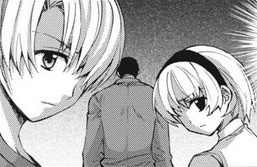
We then cut to Ooishi. He's trying to connect the dots and trying to figure out how the Sonozakis are behind all this. At this point, we know everything is a mix of coincidences and coverups by Tokyo. Literally none of the murders have anything to do with each other. They just all happened to fall on the same event (not even the same day since the festival doesn't have a set date) for different reasons.
The only thing they have in common is Tokyo decided to coverup certain aspects of each incident to hide the research Takano and Irie were doing.
We get some backstory about Ooishi and the foreman. The foreman became a second father to Ooishi. He taught Ooishi why cops are bastards and how to play mahjong. When Ooishi reflects on his death, he's most upset over how they never recovered his right arm.
Miyoko remarked that her father would pat her head with his right arm. One of the most devastating aspects of his death was he lost his right arm. And in a similar way, Ooishi's father-figure also lost his right arm.
Ooishi knows his chance to find the truth behind the foreman's murder is almost up. He is going to get far more aggressive in his search, and ideally he'll find the culprits before anyone dies.
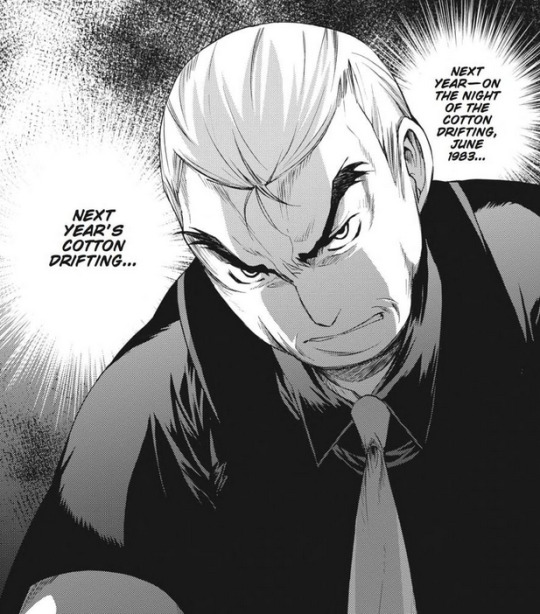
And then we cut to Mion and Rika talking about Satoshi's disappearance. Mion is frustrated with her own weakness as she couldn't do anything to help Satoshi despite her position as the heir to the Sonozakis. Despite her status, Mion is just as chained to the village's past, reputation, and fate.
But Rika assures her that someone will soon come who can break their chains. And next year, they will overcome everything.
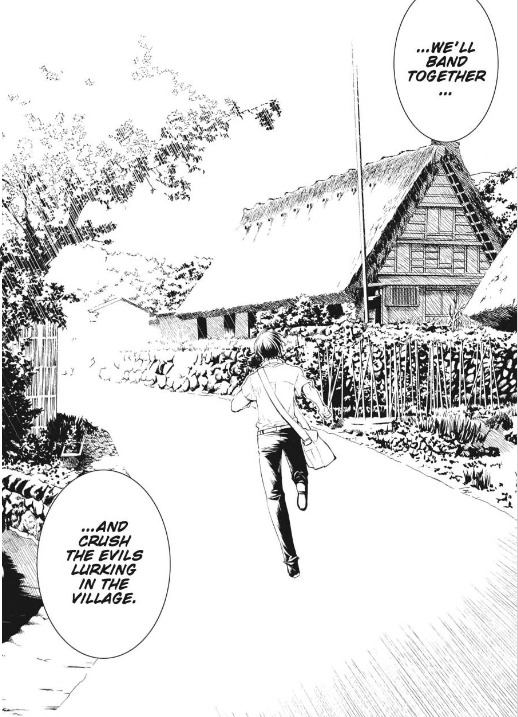
This chapter had three different perspectives from Irie, Ooishi, and Mion. Irie is an unwilling instigator who wants to end all the tragedies; Ooishi is an investigator who wants to uncover the truth behind the tragedies; Mion is a victim caught in the middle of all this, unable to stop these tragedies while also being blamed for them. They all want the same thing though. They want to see a June 1983 where the tragedies are finally ended.
Rika needs to bring together hearts with the same wish for a miracle to make it happen. We've seen Takano's origin and how Tokyo has trapped Hinamizawa in its grip. Now we've seen the rise of hearts who would fight back. Next, we'll see how they come together to overcome their shared fate in June 1983.
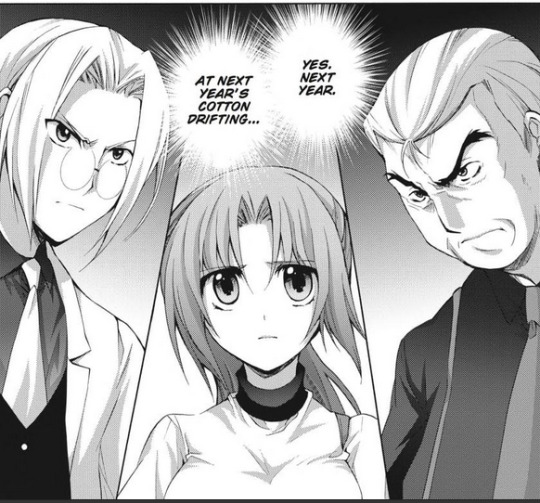
back
3 notes
·
View notes
Text
How I'd do a Zelda film-
Well, I'd actually do two.
The first film would be largely about the rise of a new Link and Zelda, and would focus on them, their relationship as a duo and their characterisation. They would be deuteragonists, because a) that's way cooler than putting Zelda in the kidnap / self imprisonment box, b) that allows us to properly develop their characters in the runtime of a film and c) it gives our protags someone to interact with at all times without having to choose any of the companion characters at the expense of the others.
For Link I'd base him mostly on BOTW link in that he's largely mute, but Zelda and other characters discuss things he's said or done off screen, informing his personality. He would also have a rare voice line here or there because I would heavily focus on his characterisation; struggling to ascend from farmer / smiths apprentice / similar to hero.
For Zelda, I'd take a couple ideas from a couple of places; Among them, I'd combine her "I see the problem, I'm going to fix it, whoops I got in over my head" attributes from OOT with her "I'm responsible for a whole kingdom of people" mojo from TP and BOTW / TOTK, and finally a whisper of the distant princess theme she had going on in TP.
For both of them I'd dedicate a little time to some people close to them, like a version of Impa, a Telma equivalent, a Malon, maybe a mentor figure for Link like Rusl.
I'd establish the cycle of reincarnation as a central concept in the narrative, with Link and Zelda having moments that clearly play into this- the duo has to cross a flooded river, link seemingly sees something in the waters, dragon roost theme surges and we cut to them rafting across. They need to infiltrate an enemy fortress, we see Zelda eying an enemy uniform as Impa's theme subtly plays in the music, and we transition via shadow to her sneaking around in an androgenous disguise. That sort of thing.
The villain would be a relatively minor player, like Malladus or Veran- Malladus would be my preference, as being a toon link villain ties into the theme of these being a 'young' Link and Zelda (though they'd probably have to actually be older iterations of the characters to account for adult actors). I would use Malladus or Veran specifically because their mind control powers lend themselves to a slow start to the plot, where there is clearly a threat for Link and Zelda to oppose but it isn't a direct threat of force, so the pacing can afford to be slower. And yes, I'm saving Ganon/dorf for the sequel, but I got a reason okay?
The deku tree pops up a few times to narrate and dispense exposition, and by the end of the film Link and Zelda know that they are reincarnations and Zelda is seemingly comfortable in that role.
Film two is about Link learning to be the same; he was happy to play the role of the hero in the first film, save the people and his new friend and all, but after a time skip and a few off screen minor adventures, he's having a bit of an identity crisis. What value does he, Link the (insert down to earth profession), actually add? Everything he did in film 1 was just an imitation of The Hero's achievements, another loop of The Hero's adventures.
And then Ganondorf shows up, King of Thieves Ganondorf in fact. A Ganondorf who's gone through a few cycles, learnt from his prior conflicts, and is extremely powerful- as strong as he was in TP, if not slightly stronger. From the moment he shows up, Link and Zelda are reunited because they're on the back foot, evacuating castle town and scrambling to defend the refugees from Ganon's monsters, let alone the man himself (this Zelda's a lot less powerful than BOTW Zelda, to put herself on a more even playing field with Link).
The deku tree shows up and tells Link about the master sword, and about a quarter of the way into the film, Link enters the sacred grove.
And doesn't pull the sword. Not because he can't, though he certainly believes as much, but because he can't take another step into being The Hero. He feels like he's being subsumed by it, like he adds nothing to this grand, looming thing and is instead being replaced by it.
We get some fun drama as the extremely panicked Zelda (who feels super responsible for all her people that are dying) is very upset that Link won't take up the sword, so she draws it herself- but, of course, it will not sparkle with the power to repel evil in her hands. Fi will not accept her as her master. She ends up carrying it with them as they continue the plot.
Over said plot, the duo fight back against Ganondorf and protect the different peoples of Hyrule ala BOTW / TOTK, in the course of which they end up forming a group of allies like The Resistance from TP (with a little influence of the TOTK sages, but more down to earth- they don't have any real super powers or destined duty like the sages).
In a certain, brutal, edge of the seat skirmish, it turns out that Link is actually really good at directing this group- helping them protect eachother and capitalise on their individual strengths.
This Link does have a new skill to bring to the table, does have a self beyond his status as a reincarnation.
The simple truth is that The Hero is so mighty because of the people he became, not the other way around- The Hero didn't know how to sail, the Wind Waker learned to save his sister. The Hero only knows how to fight because Skyloft Link learned, to become a knight, to protect his people, and later to help his friend. The Hero isn't some separate alien influence, it's a legacy, a legacy he is contributing to.
A little while after that battle, after Link and Zelda patch things up and we get to see a confident Link kick some ass, he decides to take up the master sword. Fi is delighted to meet him again.
They fight Ganondorf, who particularly demonstrates his knowledge of The Reborn Goddess and The Hero by repelling manoeuvres that reference other cycles (blocking End Strikes, using Dead Man's Volley to conceal tricky plays instead of playing it straight, using cover and his monsters to prevent the sword and arrow combo from WW and TP.) The moves that actually get him are ones that involve the Resistance, tricks the duo have taught eachother, manoeuvres that previous duos never had the time to work on together.
They defeat Ganondorf by being themselves.
#Just some ideas#I know that giving Link any dialogue is controversial as balls#But I do what I want#legend of zelda#loz#character ideas for loz#legend of zelda film#legend of zelda fanfiction#fanfiction#Honestly I'd probably do it as two seasons of episodes instead of two films
2 notes
·
View notes
Text
Monogatari Read-Along Re-Watch — Kizumonogatari
Inspired by some others on tumblr, I'm going to read each Monogatari novel and then watch the anime adaptation arc by arc. I don't have anything in particular I'm looking for, just wondering what the differences are and how the two compare. Since the English box set of the novels put Kizumonogatari ahead of Bake, I'm doing Kizu first.
Novel
I've read a lot of first-person fiction recently, and Koyomi's narrative voice feels like it's coming from deeper inside him, somehow. It's not quite stream of consciousness, but more like stream of reminiscence. Rather than just recounting what happens, Koyomi is recalling it, commenting on his memories as he processes them. This gives us an extra layer of insight into his emotional state, as he both describes what he felt at the time and how he feels about his actions then in retrospect.
Another fun feature is the language and wordplay. Obviously it's not always possible to directly translate the Japanese puns (and I'm not qualified to judge if it did) but there's a sprinkling of English language tricks that only work in writing, which I'm given to understand are a pretty good equivalent. A lot of what gives Koyomi his unique voice is the way his mind skips between the focus of the moment and small distractions, which often take the form of these language games.
The dialogue between the characters was great, too. This is just as I expected, since dialogue is arguably the thing that made Monogatari into a phenomenon. Nearly every character has Koyomi on the back foot in conversation at some point (or almost all the time) and the interplay with his mind-state makes the dance of jokes and jabs that much more engaging.
This was my first time reading anything by NISIOISIN and it really was a treat. I'm definitely looking forward to what else I can learn about the characters beyond what the anime had time to show.
Movie
As a movie with different artistic direction and production processes than the TV anime, it's aesthetically quite different from the rest of the series. As is often the case, this manifests in more detailed character designs and intricate movement. Kiss-shot and especially Tsubasa are at their very best in Kizumonogatari. It also features five action scenes of varying length, and these definitely benefit from the extra animation time. Oshino Meme spends relatively little time in motion in the TV series, so getting to see his character come through in his actions, fight scene and otherwise, was much appreciated.
The issue for me arises when looking at what's missing from the movie. The TV series jumps through hoops to capture Koyomi's (and other viewpoint characters') internal mental state. The movie doesn't take us nearly as deep into Koyomi's head. This lets it be more subtle with conveying where he is mentally, but it cuts us off from a lot of his actual thought process. His thought process is what defines the entire voice of the novel and this feels like just too big of a thing to give up.
Kizumonogatari makes great use of the strengths of the movie format, and I did indeed like it more this time with the context of the book to make some parts hold together better. It's just that the great tradeoff of time constraints associated with that strength were allowed to run counter to what makes Monogatari what it is at an even higher level.
Conclusion
Kizumonogatari has always been my least favorite part of the series, and that hasn't really changed. However, reading the book has given me a new appreciation for this important chapter. I wish the movie had been able to capture more of it.
2 notes
·
View notes
Text
RAIDOU remaster livetweet thread (4/4)
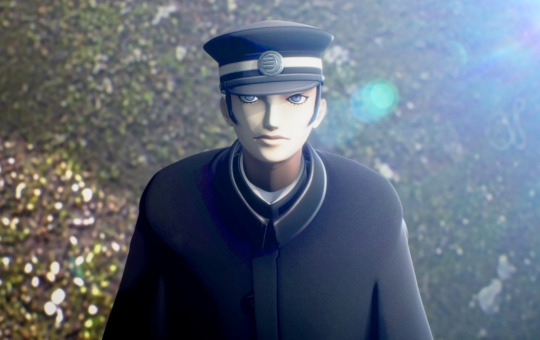
his cute disheveled look
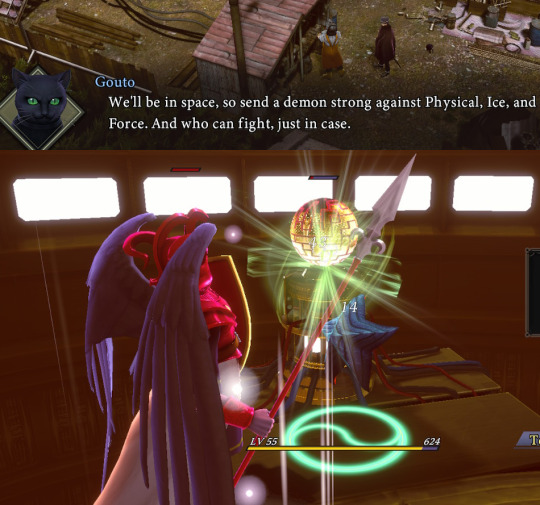
when you think the affinities would be solely related to the harsh space environment and then a fucking power with zan skills comes
~
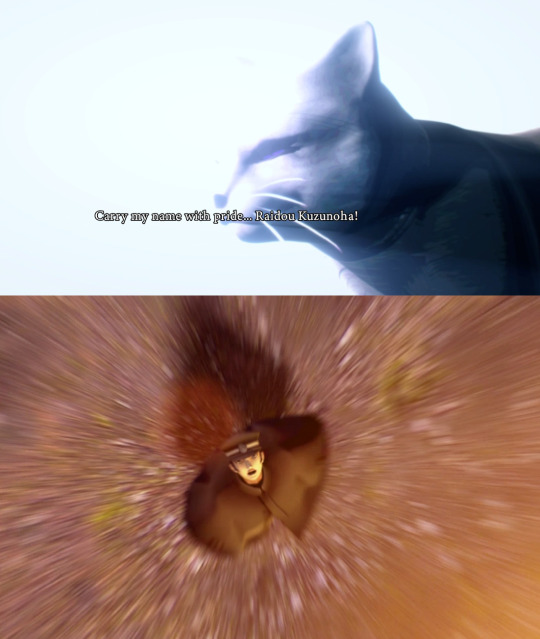
raidou: nooooooooooooooo
i was talking to a friend the other day that all that thing of narumi thanking raidou for "changing him" felt very out of nowhere (as in, he should've gotten a chapter focused on his past or at very least proper moments interacting with the player instead of a barebones exposition and expecting us to just take in that)
meanwhile with gouto.... gouto and raidou progressively becoming emotional to each other is all there..... specially after the space missile arc when gouto gets destroyed to pieces in the explosion with the demon you sent (rip decarabia 2025-2025)
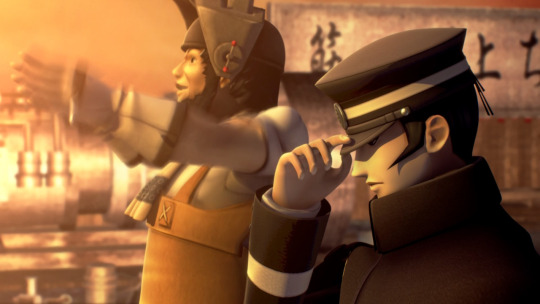
look at how traumatized you made him you feline cunt
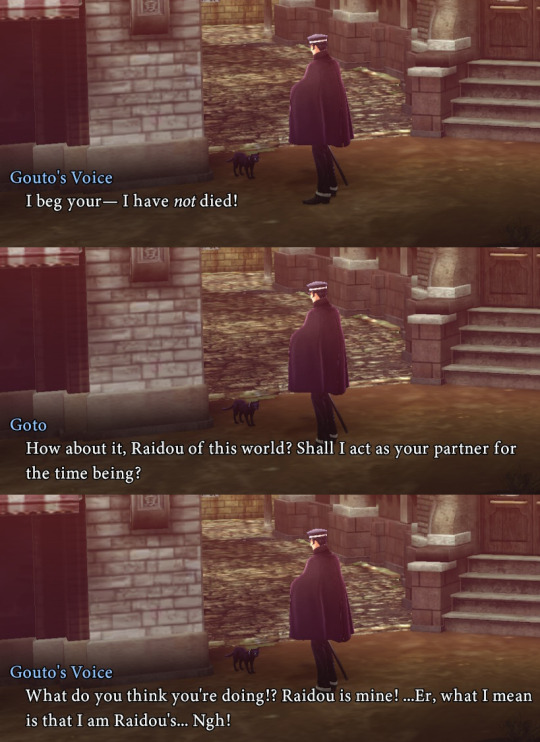
~
the shading in the cutscenes mostly contribute to it but geez raidou has the most yassified lips i've seen in a megaten protagonist
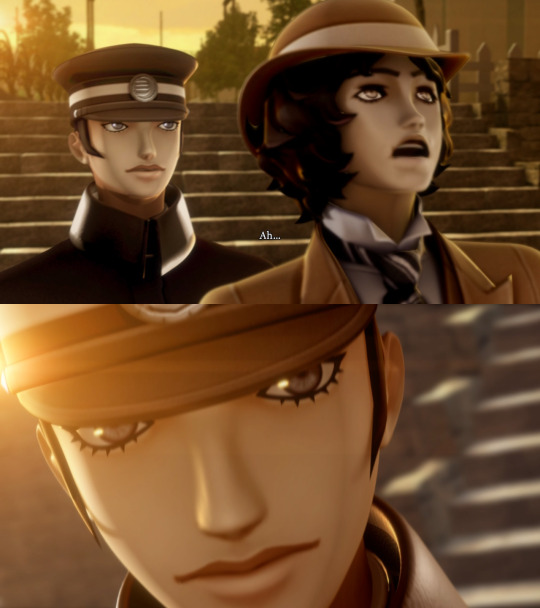
natural liner, no filler, doctors hate him
~
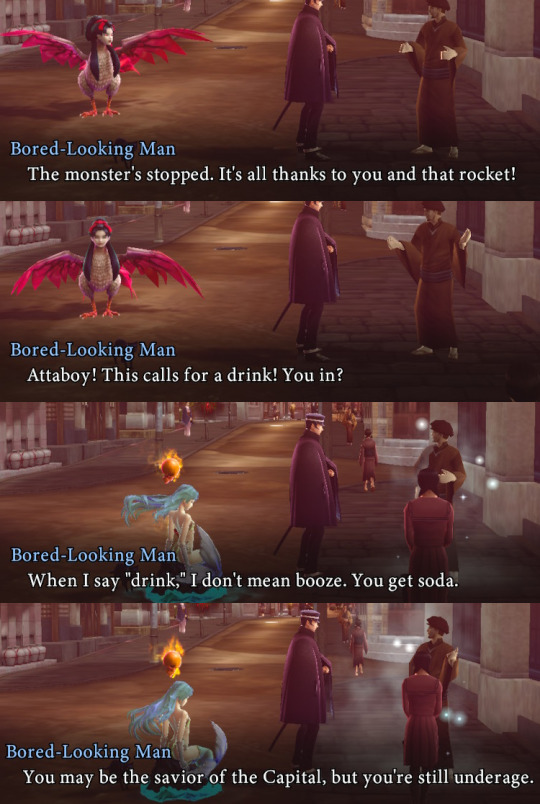
raidou with blood smeared all over his gun and two swords:
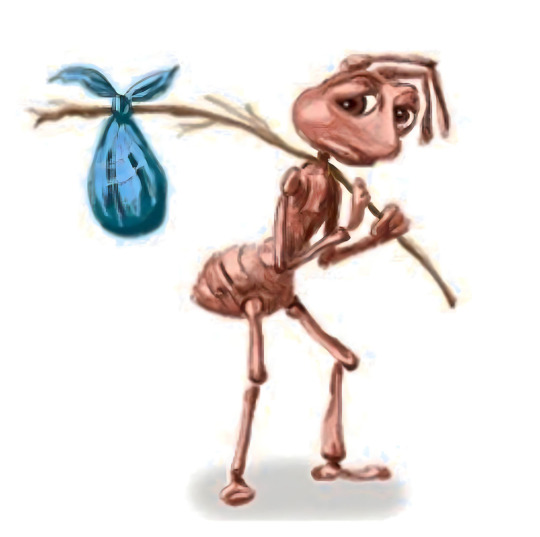
~
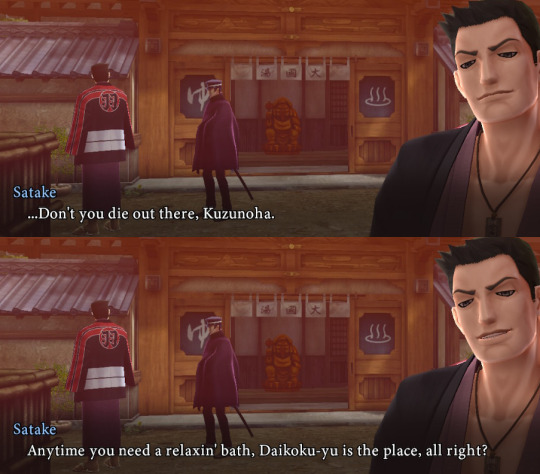
fuck narumi, this was the age-gap ship we deserved
~
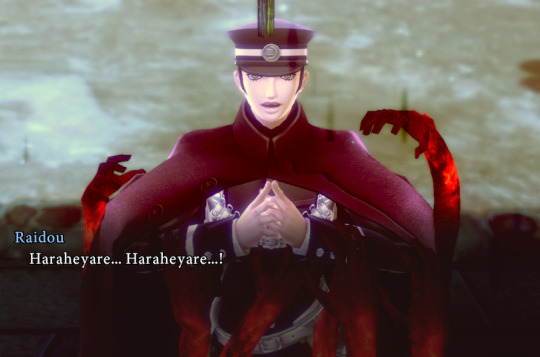
only took notice of raidou's chants summoning those perverted hands now
another one for the doujin idea pile
~
we arrived to the best part of the game, the dungeon i've been listening to its theme for over a decade. i'm overjoyed that the akarana corridor is absolutely incredible thematically-wise as well
youtube
it takes you aback this little addition they obviously must have made for the remaster
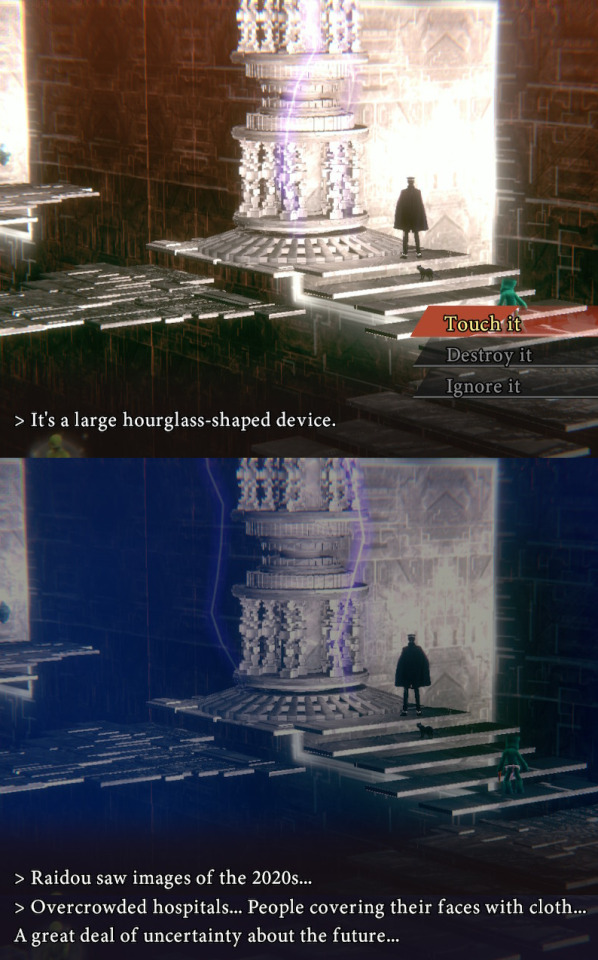
~
really dig this detail of people from different timelines having a weird way of speaking from raidou's perspective
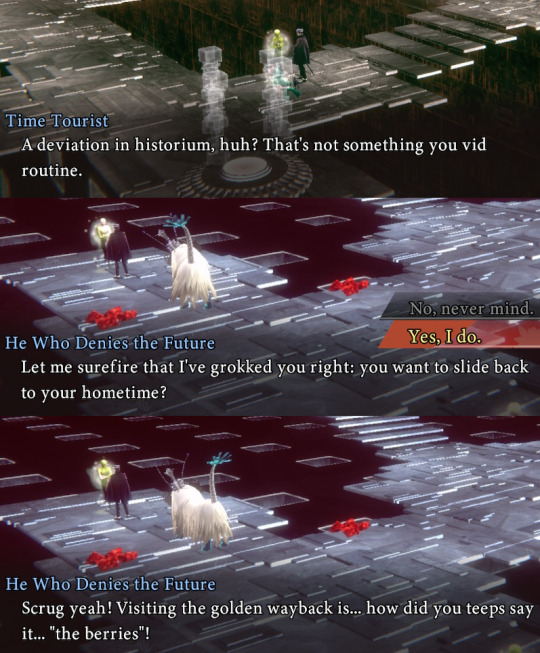
~
time for another rant
from what i saw of soulless army paralleled to the smt4 duology, the strenghts and weaknesses on the writing department of yamai's games stayed consistent
the good: the love for detailed worldbuilding and complex narratives (ex: MAG being relevant beyond just a gameplay feature, the thought-provoking grey morality of yatagarasu, care in explaining period differences in the sci-fi aspects, etc) alongside social commentary of the tangled relationship between history and how myths get shaped and taken advantage of by those with power
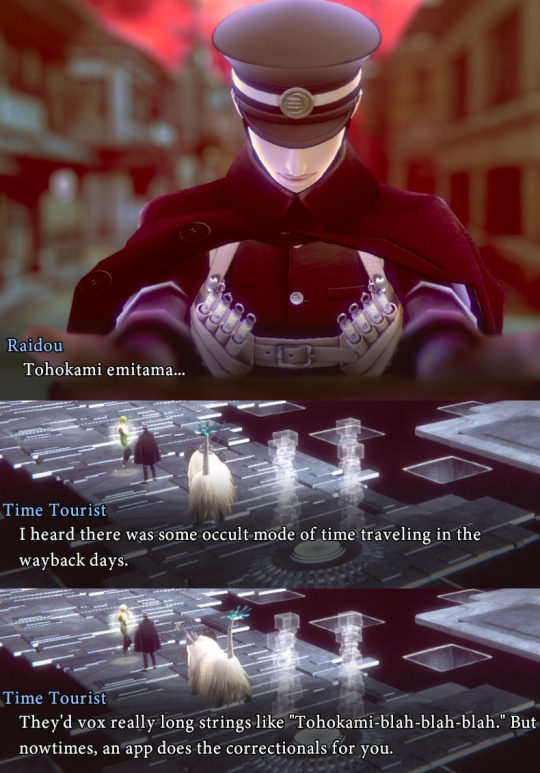
the mid: something that bothers me in those "the monster is an allegory" plot structures that is present in most megaten games is that there's an inclination of "blaming the monster but not the people behind the monster" aka blame the crime but not the criminal type of thought.
obviously, criminals shouldn't be thought as irredeemable devils as they are a consequence of the society they grew in which is very much the point they consistently want to deliver with these but at the same time you can't help but feel there's this push on a generic "let's all be good terms with each other" while the harmful lines of thought that turns them into "the allegorical monster" in the first place are barely explored
doing a random example here but it's the equivalent of, let's say, a woman being beaten to death by her ex-boyfriend and the plot deciding to give space on how much of a good boyfriend the ex used to be before becoming "corrupt by a devil" and killing her by jealously and not much work is done towards pointing out "hey, patriarchy makes men feel possessive of women, this guy already had this normalized in his mind but he showed a kind person front as long as his girlfriend was under his control". both raidou and smt4 (and megaten overall) have this basic foot on people in power becoming poisoned within the system and being the seed towards calamities whereas we see yamai's signature themes of putting emphasis on calling out xenophobia, social stratification and how religion is deeply intertwined with these, which is a good starting point. but as a long-time fan, you want to see the foot going deeper in the water than that
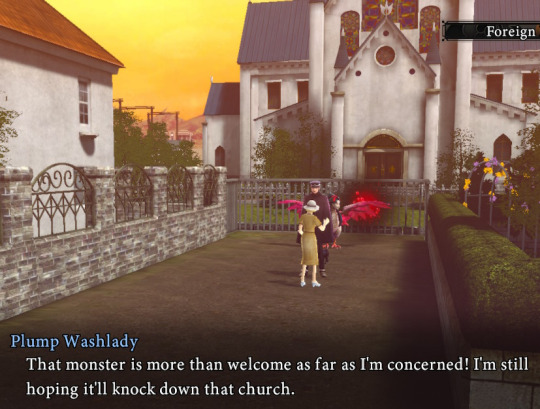
what i'm trying to say is that it's not enough to only say that society's problems will be pessimistically generated infinitely because of "human psyche". the storylines of traditional megaten tend to peak through the player facing the cold hard truths of the world but when it comes to finally presenting solutions and what can be done, the narrative turns simplistic; we're given individual heroes to latch on and individual villains to beat, "power of friendship", "power of people", etcetera. yamai himself is self-aware of the shallowness of this type of outcome because of what we see happen to flynn in smtiva, which emphasizes what i said of the spirit of megaten essentially thriving off the power fantasy of the potential of shaping the system to your liking, and yet, we still haven't seen revolutions under a carefully crafted philosophy, but under the allegory of violence we've seen countless times at this point (and this isn't even mentioning how often it gets mixed with malicious motivations almost as if they're inherent to any type of revolution)
tldr despite megaten's interest in how institutional corruption ruins the lives of the marginalized, the franchise has a tendency to show more interest in the psychology of the abusers/those in power/those with privilege than the marginalized themselves
and through these, i deliver, with the most predictable and yet still a sad sight to see given the very themes yamai touches upon,
the bad: premise of commentary on female empowerment and/or women dealing with sexism and yet female characters are once again given overtired roles of damsel in distress and/or are given less relevance than men
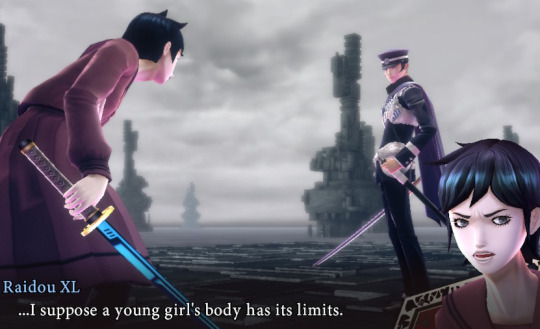
*PHEW* alright so let's finally talk about kaya and the true antagonist of soulless army
in my second raidou thread, i showed a glint of hope towards kaya. even if i am long used to the bottom tier treatment of female characters in this franchise, a traditional family like the daidouji that locks up every daughter after they turn 16 and kills them because "they have a curse where they get possessed by a demon" showed potential towards a certain implication. right?
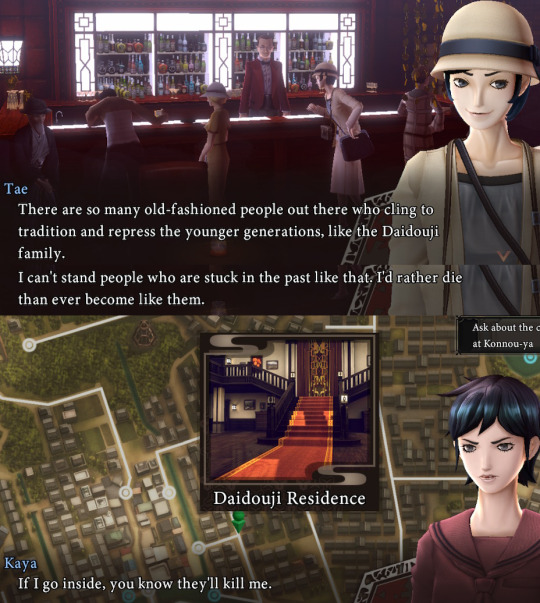
after she gets rescued, we see kaya intimately interact with raidou by asking him his real name and wanting to call him only by jouhei (which has a very special significance)
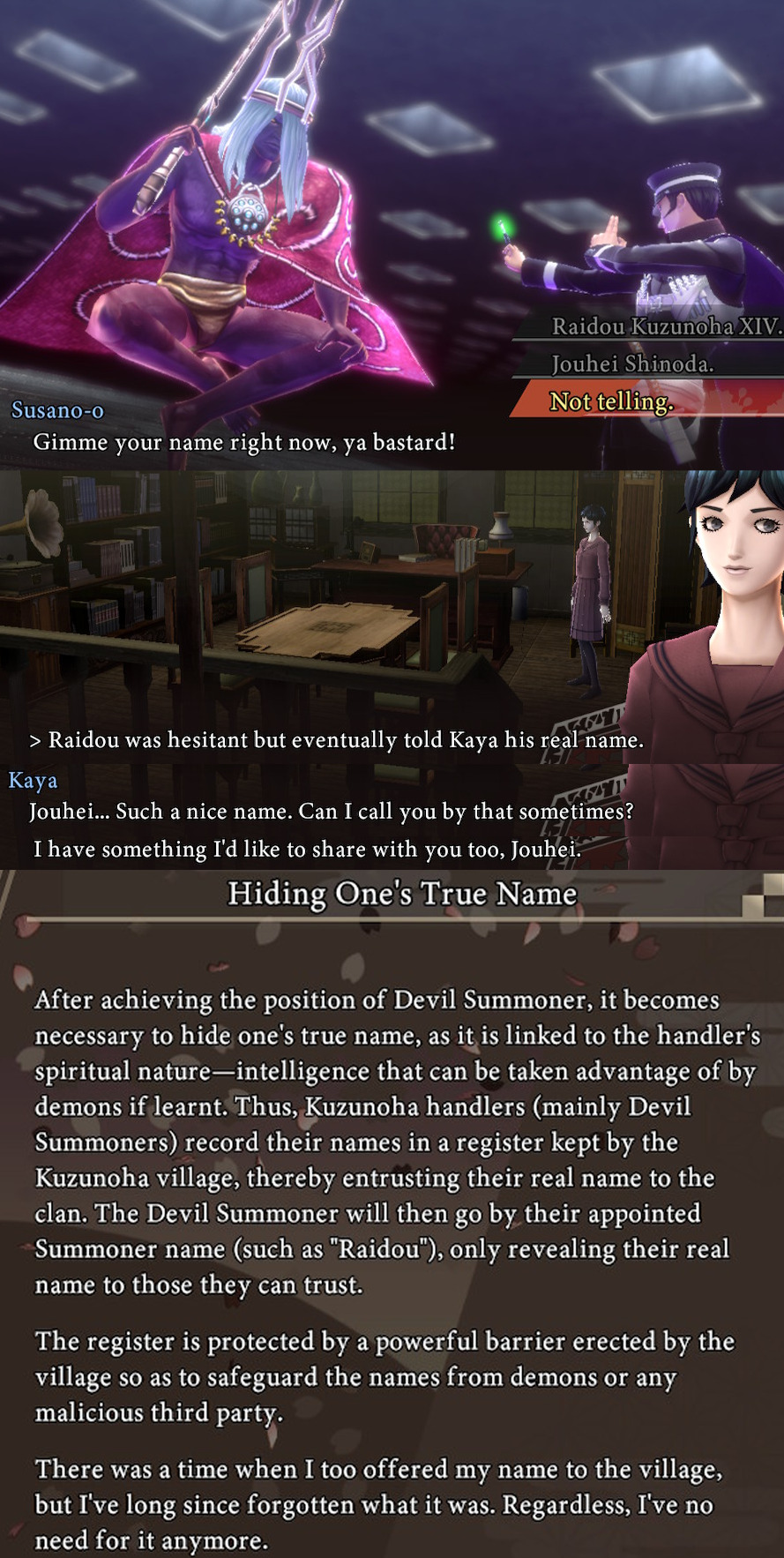
(the lore notes are canonically typeset by gouto)
afterwards as we walk through the city with her, we see kaya showing jealously of people that are able to live in freedom. she also wonders about raidou having to live under a pseudonym and the expectations he has to live with, all of this incredible character exploration that neatly complemented her own role
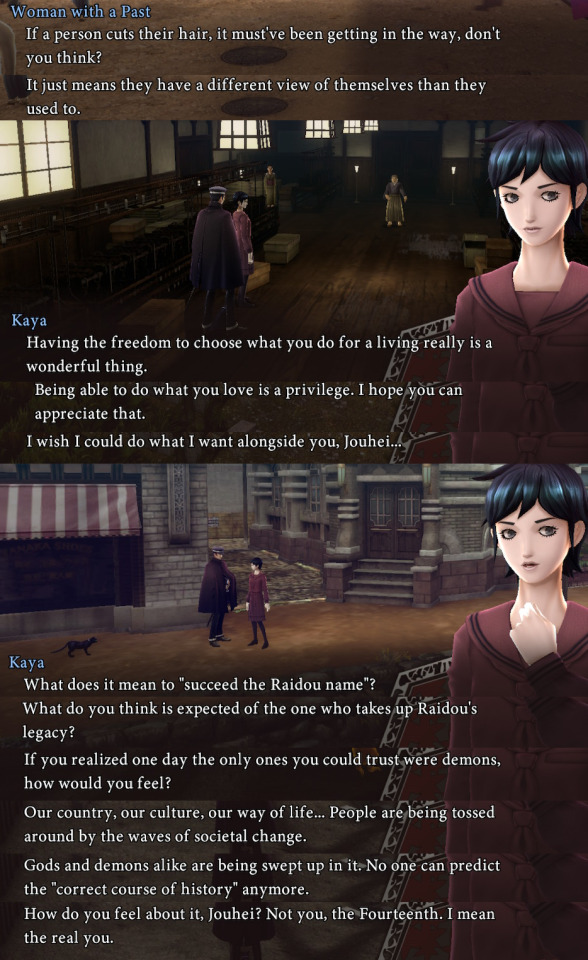
what added even more hype was her immediate tone of distrust if raidou acts in servitude towards the kuzunoha clan and the yatagarasu:
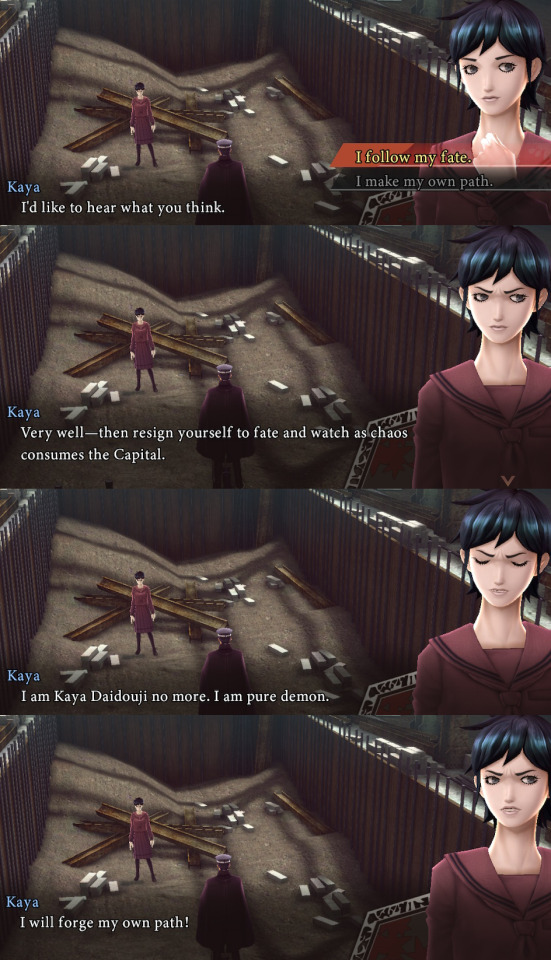
but then...
it's revealed that it's not that kaya or any of her previous predecessors went through the demonization process (caused by one's own feelings) that happened to the people infected by the hirukos. turns out that the daidouji daughters's thoughts are irrelevant to what happens to them: they have their bodies possessed by a raidou from the 21st century through mind time-travel for the purposes of being used as v e s s e l s
basically this whole interesting dynamic we see of kaya and raidou wasn't meant to be interpreted as a helpless girl chained by her family's customs being impressed by a guy's strength and independence but as a descendant of the raidou line having feelings of resentment and revenge towards his ancestor from a "more peaceful" era
in other words, there isn't a single raidou x kaya solo moment in the game except in the very end where she thanks him for being rescued (again). and then the credits roll. lol. lmao even
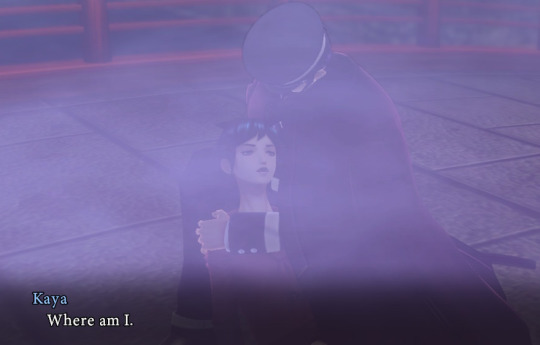
now i know the rebuttal from here will be "well, all that means is that the focus wasn't on raidou versus kaya but on raidou of the past versus raidou of the future". uhhhhhh i guess
fine, the main conflict is revealed to be centered on the raidous amid the vulnerability of the timelines. i absolutely don't think it's a bad concept on its own as i thought the last dungeon was where soulless army peaked and totally one of the coolest things i ever saw in the franchise
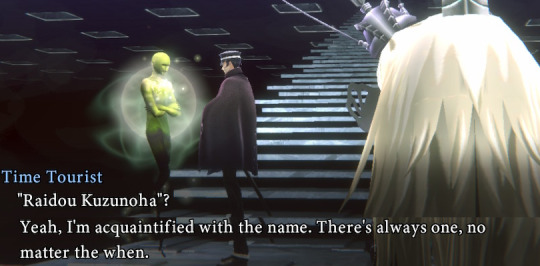
but the thing about this raidou the 40th is... he's a faceless villain that we only see either in that occasion disguised as kaya and at the very end when trying to murder everyone, his background was pretty much only shown through he telling raidou in his final boss speech instead of being shown to the player (once again, the same defective narrative that happened with narumi).
it irks me even more that they put every incident of the game that had drastically different causes underneath (the amatsu oppressing the kunitsu, the daidoujis abusing their daughters, munakata radicalizing the army and destroying half of tokyo) as entirely orchaestrated by this gen alpha raidou like.... ok
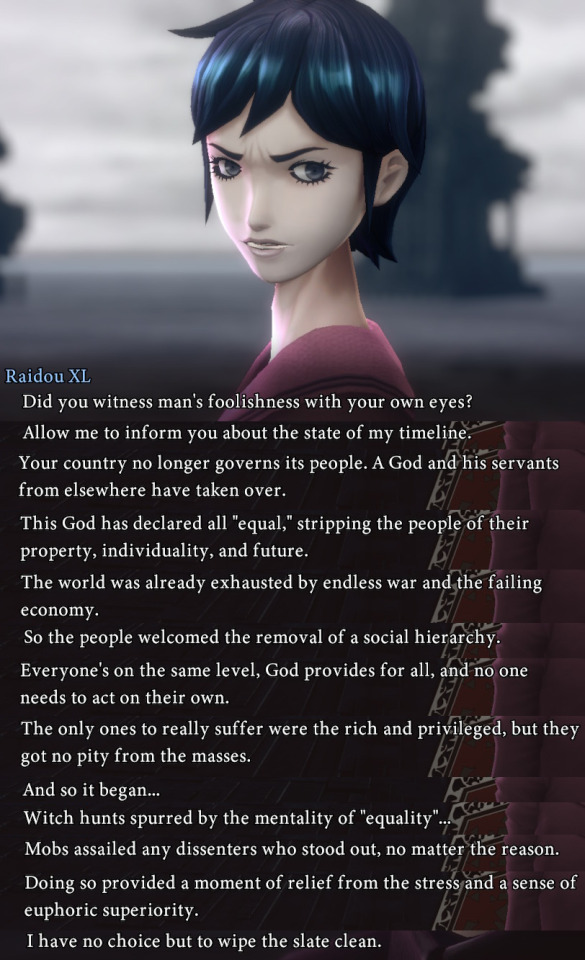
"no you see guys, to win against fascism we have to go back in time and make the fascism of the past even worse"
just your hypocritical chaotic rep in steroids that we'd see more of in later titles, nothing else to say on that i haven't before. i'm once again thankful SMTIVA and SJR exist
~
well shit, i found out you can get locked out of being able to forge a specific weapon if you don't get an item from a certain dungeon because you can't return after you finish it. the ability it gives (resist physical) isn't that super required if you have demons with tetrakarn in your party tbh but my ocd hates having an unfinished task so putting this on the list of things to remember when i feel like replaying it
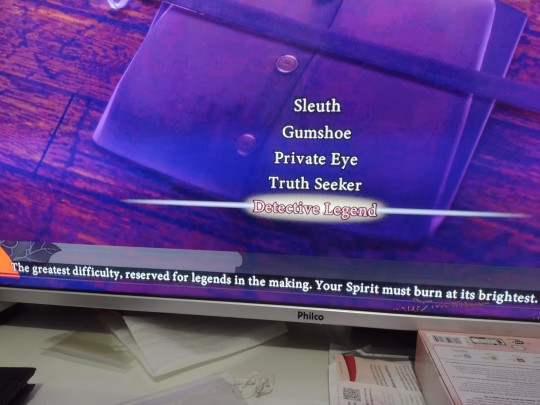
in ng+ the defacto hardest difficulty gets unlocked... i played it a little and it was almost equivalent (if it's not pretty much it) to a no-damage run for the bosses loool
~
anyway that was that for soulless army!
narumi's background wasn't explored appropriately despite its heavy themes, kaya was a no-character and the villain was all over the place. i wish the loyalty system was more complex than what we got.
great game otherwise, the depiction of the clan kuzunoha here is the juiciest of the subseries and the most fun to make fan content. i became in love with raidou even more ❤️
i'll cement my opinion on yamai overall once i play the sequel. stay turned
1 note
·
View note
Text
Exclusive: Lost Lord of the Rings Chapter in Which Sam Gets a Blister from All That Walking Finally Leaks Online
By Mushycrouton, Middle-earth Footwear & Lost Manuscripts Correspondent

In a shocking discovery that has left Tolkien scholars reeling, a long-lost chapter from The Lord of the Rings has leaked online: one that focuses almost entirely on Samwise Gamgee suffering through a massive blister, the inevitable consequence of trekking hundreds of miles in subpar hobbit footwear.
Believed to have been cut from The Two Towers for “narrative flow” (and possibly because Tolkien realized he had already written 500 pages of walking and this was a step too far), the chapter, titled Of the Sore Foot and the Small Complaint, provides a deeply personal and excruciatingly detailed account of what should have been obvious to readers all along:
Sam’s feet must have been absolutely wrecked.
CHAPTER SUMMARY: A HOBBIT’S FOOT-BASED NIGHTMARE
Set just after crossing into Mordor, the chapter follows Sam struggling with a blister that has now reached the size of a Shire-grown gooseberry, rendering him almost incapable of continuing their journey to Mount Doom.
Unlike previous perils- Nazgûl, starvation, existential dread - this one cannot be solved with bravery or lembas bread.
The lost chapter describes in excruciatingly realistic detail:
Sam’s desperate attempts to ignore the pain, even as each step feels like he’s being stabbed with a Morgul blade (but exclusively in the foot).
Frodo’s growing frustration, as he is carrying the literal One Ring of malevolent evil and now also his best friend’s foot problems.
Gollum’s gleeful horror, as he watches a blister take down his greatest threat: a hobbit with too much endurance.
The bulk of the chapter consists of increasingly painful exchanges between Sam and Frodo, as Sam tries to downplay the agony, while Frodo- who has carried him before and will likely have to do it again - watches in despair.
SELECTED EXCERPTS: THE SUFFERING OF SAMWISE GAMGEE
“I can’t take another step, Mr. Frodo,” Sam gasped, stopping in his tracks. His toes curled, his whole body shaking.
“I swear upon the Gaffer’s garden, I’ve got a blister the size of a dragon egg.”
“You must go on, Sam,” Frodo said urgently, looking at the blackened sky ahead of them. “Mordor will not wait for us.”
Sam, breathing through gritted teeth, nodded. “Aye,” he muttered. “But my feet don’t give a toss about Mordor.”
After several agonizing pages describing the blister’s dimensions, the state of Sam’s socks, and an unexpected but beautifully written tangent on foot-based suffering in the Shire, Sam ultimately collapses in pain, refusing to take another step.
It is then that the chapter reaches its most unexpected moment: Gollum, who up until now has been a venomous ball of sneaky malice, suddenly offers… help.
THE SMÉAGOL-COMPEED SCENE: AN UNEXPECTED TURN
Just as Sam resigns himself to crawling the rest of the way, Gollum (watching with a mix of fascination and glee) suddenly rummages through his loincloth (disturbing) and produces a strange, flattened object.
“Poor, poor hobbit,” Gollum whispered, his large eyes filled with mock sympathy.
“Blisters, yes, we knows about blisters, precious. Very nasty. Very hurty.”
Sam glared at him. “If you say ‘fat hobbit can’t walk,’ I’ll smack you across the cliffs.”
“No, no, no,” Gollum hissed, rocking back and forth.
“We helps.”
To Frodo’s horror and confusion, Gollum extends a withered, clawed hand - holding what appears to be an ancient, second-age equivalent of a Compeed blister plaster.
“We found it, yesss, years ago, long ago, near men’s things. Sticky. Helps, we thinks.”
Sam eyed the strange offering suspiciously. “And I’m supposed to put that… on my foot?”
Gollum’s grin widened. “If hobbit wants foot to stay attached, yesss.”
What follows is a painstakingly detailed, incredibly uncomfortable description of Sam peeling his sock off, Frodo dry-heaving at the sight of his ruined foot, and Gollum carefully applying what appears to be a sticky herbal poultice stolen from some long-forgotten Númenórean soldier.
Surprisingly, it works.
“By Gandalf’s beard,” Sam muttered, flexing his toes. “That’s… better.”
Gollum clapped his hands together, delighted. “We helps! We helps! Yes, yes, we are good to hobbits, we are!”
Sam glared. “Let’s not go that far.”
WHY WAS THIS CHAPTER CUT?
Tolkien scholars believe that this chapter was removed for multiple reasons, including:
Tolkien’s editors possibly warning him that readers were already aware that walking hurts.
The sheer level of foot-based agony possibly being “too realistic” for fantasy escapism.
The fact that Sméagol administering foot care was maybe the most unsettling thing he had ever written.
Despite this, literary experts believe this lost chapter offers a crucial piece of realism missing from The Lord of the Rings.
“Every reader has wondered how they managed to walk that far without injury,” said Dr. Priya Mehta, Professor of Fantasy Realism & Unspoken Foot Trauma.
“This is the answer. It was an absolute nightmare.”
FAN REACTION: A UNIVERSAL MIX OF HORROR AND RELIEF
Following the leak, Lord of the Rings fans have been divided over whether this chapter should have been included in the original text.
“I didn’t need this. I really didn’t.”
“Samwise Gamgee receiving first aid from Gollum is peak LOTR.”
“Tolkien had 10 pages on this and cut it, but kept Tom Bombadil? Unforgivable.”
At press time, Tolkien estate lawyers were scrambling to suppress the leak, while hikers and marathon runners worldwide were hailing Sam as the most relatable character in literary history.
Meanwhile, Compeed™ has yet to comment on whether they will be producing a limited-edition “Middle-earth Blister Relief” pack, but fan demand is already high.
0 notes
Text
hi i dont have anywhere to deposit my umineko thoughts now that im a little more than 1/4th of the way through a playthrough so im depositing them here. mostly so i can come back later to see how right or wrong i am. i dont think this post would be interesting for anyone but myself. spoilers below the cut
some notes:
i am much less interested in the concrete individual mysteries and locked rooms than i am in the overall themes and meta-narrative
im watching a youtube playthrough so my ideas may be influenced by the youtubers
i just finished the scene of the second twilight in ep 3
i know/have seen enough of higurashi to know who bern and lamda are analogous to in that story
ive seen a handful of very very vague spoilers including: at some point maria also receives the title "the creator" (i do not know what that entails), rosa and shannon may become beatrices at some point (i saw fanart tagged similarly to evatrice fanart), battler becomes a "sorcerer," kinzo died 2 years ago somehow (???) and at some point there is a character who sentences people (i dont know who) to death in some kind of trial????
anyway here are some collected thoughts on theme assembled in no particular order:
i think the "point" of umineko is going to be that it's a story about storytelling. the "witches" very much all seem, to me, like young girls telling each other fucked up stories. in-text they frequently call each episode "a game" but it plays out much more like collective storytelling, where they all have varying amounts of influence. the magical fights in particular remind me of seeing people god-modding in rps on gaia online when i was 14.
beato is only just getting her footing when it comes to telling a story. she really wants to tell a gory fantasy story but battler refuses to engage with her story that way, and instead goes into it like a classic murder mystery. it frustrates her to have an audience that doesn't seem to perceive her story as "fun" like her fellow fucked up traumagirlie witches do.
virgilia is a more restrained storyteller who thinks more about the emotional aspect of stories, and this is why beato says she's always sucked at "these kinds of games" when they're having their magic fight where the goal is to ridiculously one-up each other.
battler is also a fledgling storyteller, but everyone around him wants to tell fantasy stories and he can't let go of stories more grounded in reality.
im guessing the trial i got spoiled for but haven't gotten to yet is going to put all the witches and maybe battler on trial for their storytelling techniques. the point will be to ask the reader to personally evaluate what value different kinds of stories have. maybe it'll also ask battler to prove concrete culprits for the murders in each episode?
there's also themes here about how empathy is a skill that children have to learn and how trauma can interrupt that learning. this is why most of the witches so far are described/portrayed as cruel but also innocent. they're delighted by gore, dress in ridiculous costumes, and engage in the power fantasy of being witches. it reeks of kids emulating my little pony creepypastas on deviantart because they need some kind of outlet (and, like, same).
all or most of the characters in tea parties represent some real-world person (that we will probably never meet). beato's real world equivalent has friends like her (bern and lamda) or older than her (virgilia and ronove), and likes the real-world battler. she tells stories trying to impress him and that's why she gets frustrated by the way he engages with them. the other tea party characters are essentially her friends dropping by mid-story and contributing to either make it more interesting, or to try and help her by steering her towards a story battler would like more. she's very emotionally stunted due to trauma. i would guess her real-world counterpart's history is similar to the story we hear about Beatrice from rosa. she has an older relative who is, at a minimum, inappropriately interested in her and grooming her.
some some random notes on the mystery solutions:
any magical explanation for the murders are "not true." they are Beatrice's initial explanations for the murders, but battler will eventually go in and work basically as an editor to retcon in real-world explanations. when someone becomes a "witch," this is actually them becoming the culprit (so eva is a culprit in ep 3).
kinzo is burned in every episode to hide that he actually died years ago. his appearance in late ep 2 is due to Beatrice's storytelling - he's not "actually there." the other characters just never found his body.
because kinzo is already dead, and by the red truth we know there are 18 people on the island, the actual 18th person is beato, perhaps? im not super confident in that one.
i feel like i have basically no ideas on the ep 1 murders. i think the faces mustve been smashed for a reason, so the culprit(s) is probably one of the first people murdered, but idk who or why. i think I'd have to go through ep 1 again to come up with anything. same for ep 3 coz i havent finished it.
for the epitaph solution, i think the sweetfish was a hint about following forest trails down to the ocean, then following the oceanline. much like rosa did as a child, this would eventually lead you to the "second mansion" where beatrice lived. this mansion is actually the same as the the first mansion, and they're connected somehow by the underground tunnels. the "two" people in the riddle refer to the two portraits of beatrice and they lead to a passage that connects the two mansions. idk about the middle part of the epitaph about the twilights. honestly i think it might be a red herring added later, as the execution of the twilights doesn't actually seem to revive beatrice (she doesn't really seem to have changed at all throughout the story so far - she sort of always has some level of presence and influence). but i might just think this bc i cant figure out any kind of wordplay puzzle with it.
i think battler gets pretty close to some of the solutions in ep 2. the first twilight is easiest i think. maria is given the key, someone (my guess is rosa) takes the key in the night and commits the murders, reseals the key and puts it back. rosa is shown buying sweets early in ep 2, and in ep 3 she is shown as having sleeping pills for maria. she invites her siblings to the chapel to "discuss" and offers them drugged sweets or other food during the discussion, then murders them after they pass out. (the corpses are frequently described as looking like they're just sleeping.) she does it because she thinks she's the closest to solving the mystery due to her experience as a child with beatrice, and doesn't trust any of her siblings not to steal the gold from her.
i dont think she does the later murders. those are by a different culprit, which is why battler has a hard time solving them - he keeps assuming it's the same person. my guess is whoever commits the later murders does them because they become paranoid after the first twilight. i think it must be one of the servants due to the master key issue but im not sure who, so im stuck from there.
that's all! im excited to find out how wrong i am!
0 notes
Text

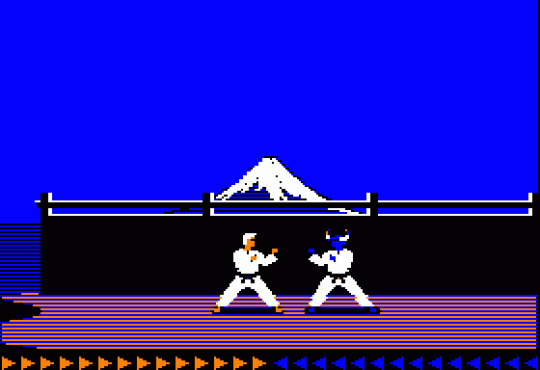
Karateka (Apple II)
Developed/Published by: Jordan Mechner / Broderbund Released:15/11/1985 Completed: 04/10/2023 Completion: Beat it! Version Played: The Making of Karateka Trophies / Achievements: n/a
The first video game to use rotoscoping (well, according to the Guinness Book of World Records, so who am I to dispute) Karateka was Jordan Mechner’s first released game and, somewhat surprisingly, one of the first martial arts video games, with only Karate Champ, Yie Ar Kung-Fu and one other I’ll mention in a minute beating it to the punch (no pun intended). Mechner even originally intended it to be a one-on-one fighter much like Karate Champ, but (as recounted in The Making of Karateka, the recent deluxe re-release via which I played this) gradually shifted towards creating a more cinema-inspired game with a classic narrative: rescue a kidnapped princess.
I talked about it in my article on Super Breakout, but Karateka represents another perfect example of multiple discovery, released likely mere days after Data East’s Kung-Fu Master (aka Spartan X) was released in Japan, a cinema-inspired side-scrolling martial-arts game where you must rescue a kidnapped princess (well, your girlfriend. Every girlfriend is a princess. Am I right, fellas?)
They are somewhat different games: Kung-Fu Master is faster paced, with less of a focus on one-on-one combat and instead more enemies and less animation, but it places Karateka in a strange position in history. Kung-Fu Master is the immediately seminal title, directly inspiring both Super Mario Bros. and Street Fighter (!) where Karateka, a western game for home computers, seeded… Prince of Persia. But wait! Prince of Persia seeded more cinematic platformers, which begat Tomb Raider, which arguably created every triple A game we know today.
So wait, maybe Karateka actually is unbelievably important!
Anyway. In 2023 what stands out about Karateka on Apple II is that 1) it’s weirdly easy? and 2) it’s weirdly playable?
It’s honestly a very simple game. You run right. Sometimes the game actually cuts so you can see enemies running towards you (which is unusual, but interesting) and then you take fighting stance and fight them via punches and kicks of one of three heights. You can move forward while punching, but if you’re kicking you have to put your foot down after a few kicks. It’s basic, and for what all the talking heads in The Making Of claim, I’m not sure it’s actually that strategic, considering I could beat everyone by either just sticking to “keepaway” kicks or spamming punches while moving forwards, returning to keepaways if I needed to heal (interestingly, health recovers for both you and your enemy over time.)
There are some cheap deaths; you die if you run directly into anyone (rather than taking fighting stance.) There’s a bird that’ll fuck you up, and then a portcullis that you have to time exactly right, both of which extend things quite artificially in a game that has only one life. That said, however, I beat this on my second try, which I found really surprising. But speaking of point 2: there’s a smoothness to the animation (yes, even with the Apple II’s blazing 8 frames a second) and immediacy to the combat that makes it… fun, just in an unchallenging sort of way. I understand why kids at the time, facing the fact that they’d just dropped the equivalent of $100 or whatever on this, played it over and over, trying to speedrun it.
I’m not sure though if the lauded “cinematic” nature of this game hasn’t been a bit overblown, though. In 1984 cutscenes existed in other games, and are cutscenes something to be that celebrated? In 1984 we’ve got Rescue on Fractalus, King’s Quest, Lords of Midnight… and Infocom creating deep narratives that use the cinema of the MIND! (Ahem.) I think having cuts happen while you’re actually playing its… interesting. But there’s a fairly good reason why it hasn’t been used much since.
So Karateka, then. It feels like a weird game to me to get an insanely deluxe re-release with a full interactive museum, but it’s a surprisingly fun diversion for as long as it lasts.
Will I ever play it again? I don’t know. It’s such a breezy wee thing to have a go on I could be tempted, but I’m better off playing Kung-Fu Master, which terrified me as a child for reasons I’ll explain if I ever write it up.
Final Thought: Next week I’ll be taking a look at The Making of Karateka in depth, because I think it’s an interesting release in and of itself.
Support Every Game I’ve Finished on ko-fi! You can pick up a digital copy of exp. 2600, a zine featuring all-exclusive writing at my shop, or join as a supporter at just $1 a month and get articles like this a week early.
#video games#gaming#games#txt#text#review#nintendo#nintendo switch#the making of karateka#karateka#digital eclipse#jordan mechner#1985
1 note
·
View note
Text
salem assassinated qrow’s spy network, at least one of whom lived in a hovel in the slums at the foot of the city and another who had a tab equivalent to about 170$ at a ramen shop that he was unable to pay off. it’s also stated in v5 that these are the huntsmen and huntresses that the council “doesn’t own,” which is probably exactly why they’re dirt poor—all the lucrative contracts probably go to huntsmen the council keeps on retainer because the system is corrupt.
but the core problem in vacuo is not the grimm. there’s grimm everywhere. the issue is that vacuo is a place where water was extremely scarce even before its population doubled and then tripled in size (count the number of “dying of thirst” jokes in the CFVY novels) and the primary food sources are:
insects and bats
giant mole crabs that are equally as dangerous as most grimm, and need to be hunted out in the desert far away from the fortified city.
to make matters worse, vacuo itself sits atop an underground system of natural caves and old dead mines left behind by centuries of unchecked colonial exploitation which, in addition to sucking vacuo dry of all valuable resources, also completely fucked the structural integrity of the ground to the point that sinkholes opening up and swallowing parts of the outer city is a relatively common happenstance.
and to make matters even worse, vacuo had a reactionary, virulently xenophobic popular insurgency like a few weeks tops before the first wave of refugees poured in, and the leaders of that insurgency have now been broken out of prison as vacuan support for their movement surges in direct response to the massive refugee crisis.
my point is that mistral isn’t subject to the same logistical and social pressures; it’s a much larger state with ample farmland and at least two, possibly three well-fortified cities suitable for settling refugees into, which makes the refugee crisis less painful (more food and water and space to go around, lower volume of people crowded into a single municipality), and that in turn alleviates the burden of the grimm because, while things are definitely still very bad, the intensity of stress caused by scarcity (hunger, thirst) and rampant xenophobia is much lower.
i will also point out that kuo kuana is not industrialized at all, has no military, does not have a fortified wall, doesn’t seem to have huntsmen, is the most densely populated city in the world, and straight up does not have a problem with grimm, to the point that even when the chieftain’s house is burned to the ground there is not a peep from the grimm. which suggests that either grimm really don’t hunt the faunus, or fortifications and militarized defense against grimm is actually DRAMATICALLY less effective at managing grimm than focusing on making sure that people’s basic physical and emotional needs are being fulfilled. if it’s the latter, then having a strong fighting force should actually be the lowest priority when choosing where to send civilian refugees, because if you put the refugees somewhere with the space and resources to comfortably absorb them, a less robust set of defenses will be adequate.
also, all of them know that salem will be coming to vacuo sooner or later, so they’re setting themselves up for a final showdown with hundreds of thousands of civilians caught in the crossfires, which is another reason why sending the civilians to mistral would have been preferable; “salem already got the relic and has no further interest in attacking mistral” is a narrative that is a) probably true and b) really comforting for the refugees whose homes just got wiped off the map, which makes them feel safer, which again decreases the volume of grimm that mistral will need to deal with.
it’s not about defense; it’s about mitigation.
NEVER DOUBT ME
102 notes
·
View notes
Text
Headcanon that Dick handles explosions BADLY, and Jason thinks this is about him and how he died, which is understandable given that Jason also handles explosions badly (if they’re not caused by him, ie ones that he’s unprepared for - which makes for a very unconventional argument in favor of being the one to introduce explosions into any particular situation and thus preemptively control that particular factor there, but then again, Jason’s an unconventional kinda guy and also I digress).
So one time there’s an explosion and both Dick and Jason are on edge in its aftermath, because of it, and so Jason snaps at Dick for being visibly rattled by it because he’s trying to distract from his own lingering uneasiness like he’s all Self, get it together Jay, its been years, you should be over it by now, even though he knows damn well trauma doesn’t work like that, its just that he WANTS it to because this is INCONVENIENCING HIM, dammit, and thus he is edgy and irritable and snaps at Dick like oh fucking suck it up, I’m sick of you getting all worked up every time there’s an explosion around us because you’re so bothered by what happened to me like, its not about you, and you being a jittery freakshow because you’re all like, oh no, lemme hijack my brother’s trauma and make it my thing is really annoying, so knock it off.
And Dick gets all quiet and pensive and is just staring at him for a long while, like he doesn’t quite know how he wants to respond to this, and so Jason doubles down and commits to staring back for as long as is necessary to win, because like, look that’s just how being siblings works and also he’s right. Except he’s not, because when Dick finally does speak, its to say with a kind of pinched, controlled attempt at keeping his voice emotionless so as not to betray any kind of anger but also hurt, and also, it doesn’t work....
So he’s just like, please don’t take this the wrong way, Jason, because I certainly don’t mean to take anything away from your own experiences or imply that I wouldn’t be affected by them just as a reminder of what happened to you, but the effect that massive, unexpected explosions have on me has nothing to do with that actually. It just triggers certain memories and emotions from the time my city was nuked by supervillains.
And then he walks away stiffly and Jason’s like aww, fuck, because the downside of not letting yourself be someone your brother feels comfortable unburdening himself to because you’re worried that means you might risk unburdening yourself to him too and that’s just unthinkable, is like, its very easy to stick your foot in your mouth when there’s a decade and a half’s worth of active superheroing in your brother’s life where he could have been the victim of or exposed to any number of ordeals, injuries or traumas and that you have no clue about, other than maybe two or three of them....and just because two heroes have shared traumas or triggers or overlap in some traumas or triggers, that doesn’t mean they stem from the same place or are equivalent or even trying to be, its literally just that they occupy similar spheres of existence/experience, but either way, its really just not a great idea to assume off the bat that any given other hero has no possible relationship with the very same experiences or traumas or triggers you struggle with yourself.
And I know people are gonna try and make this a competition thing or a gotcha moment against Jason stans or try and compare and contrast explosion based traumas but hashtag Literally Don’t Tho, because that’s honestly not the point and I do actually mean it when I say that shit is tired and boring, and they’re both allowed to be traumatized for different reasons and scale and scope are utterly irrelevant when we’re talking about two different brothers engaged in two different post traumatic stress reactions stemming from two different sources.
This absolutely literally is legit just a headcanon that’s not about blaming Jason or saying he’s a bad brother at all, this is just a possible glimpse of their dynamic at some point, based off a scene I was picturing for a fic I was writing at some point and never finished, wherein Dick’s triggered by an explosion to a degree that’s even worse that specific time than Jason’s reaction to unexpected explosions normally is on average. With the difference being that this explosion had a greenish tint to the flames and Dick just fucking freaks and throws himself at Jason to protect him, and gets hurt in the process and thus Jason freaks and gets pissed at Dick because he feels guilty Dick got hurt because of him and also is legit pissed because he thinks its cuz Dick was reckless out of some misguided attempt to protect him from something that already happened to Jason, and thus is stupid.
But in reality, the reason for this particularly extreme reaction from Dick to this particular explosion is that the greenish tint triggered a highly specific and intense recall to the memories and emotions Dick had surrounding Chemo’s bombing of Bludhaven, since Chemo’s radiation powers gave that explosion a greenish tint too. And thus Dick’s reaction here also included channeling his overwhelming impulses of that time, in which he literally ran back into the radioactive fallout zone without any of the appropriate gear, because he was so lost in the headspace of ‘all these people dying is all my fault because the villains were targeting me specifically’ that this overrides all conscious cares for self-preservation, as well as awareness of his brother’s own competence and skills.
And thus also this post is about how fucking obnoxious it is that anything that includes both Dick and Jason having trauma reactions in the same scenario usually devolves into compare and contrast or better yet, Who Wore It Best, because that shit absolutely makes it all but impossible to explore entire facets of this fucked up family’s interpersonal relationships and dynamics, when its always treated as being about blaming one person or another for hurting another’s feelings or trying to rank the most hurt in any given scene, and sometimes its really just as simple as character x kinda stuck his foot in his mouth and made things tense and uncomfortable between him and character y for a little while and that’s all it needs to be, not an invitation to The Roast of Character X, Let’s Expose Him For Being A Horrible Person, instead of just them both being brothers who occasionally set off emotional landmines around each other due to no great flaw of their own but rather just due to the fact that their lives mean they inevitably both exist at all times as islands adrift in a sea of potential emotional landmines.
This post was brought to you by the letters ADHD and also fuck you punctuation, what’s so great about you anyway.
#like I can not ever stress enough how much my insistent harping on the double standards in fandom is literally just that#about the DOUBLE STANDARDS#not about trying to point to Dick as the most traumatized or most anything or best anything#merely attempting to point out the imbalanced perception of him compared to his brothers#in order to eliminate that imbalance from the equation#and put them on equivalent narrative footing#that's IT#please do not use my meta to attempt to leapfrog Dick into First Place Gold Medal Winner of Trauma Olympics#I reiterate: I hate Trauma Olympics whether my faves are winning or losing#because nobody really wins that shit and its counterproductive and I don't want to play#and also like you can do what you want with my meta obviously#Im just saying like for this particular usage of it#I'm not actually on board with that#just FYI
25 notes
·
View notes
Text
Podcasts in review 2022
It was decidedly NOT a good year. Hence all the actual play podcasts.
Actual Play :/
These Flimsy Rituals - Divine cycle but fantasy. No seriously, they have Divines, the Rapid Evening, the Crystal Palace - and I'm 90% sure it's a coincidence. Severe lack of Keith J Carberry (or equivalent) makes it hard to listen to. Play their own system, Blades and a variety of other small games to expand the story.
Eidolon Playtest - Jojo stands in a tabletop world with moves such as "reveal your masterplan". Tarot card pulls are much cooler than dice. Their mini seasons (Giants? in particular) are a great place to start. The cast is mostly trans women who both loved and disliked Jojo (and Persona) enough to unionize and make something of their own - one of the characters in the current season is legit Naoto but good (trans). Play different versions of their own game.
Spout lore - somehow they play Dungeon World nigh gmless. The players supply the world, its geography, fauna, even reasons for this particular group of bad guys to kidnap them. Even if I consider the results of their world building inferior to some others, there sure take a ton of joy in creation (and that's beautiful). Also a TON of dick and fart jokes and the weirdest cases of no(?) homo from the cast. ALSO they do a goof (dndads style) by stealing from a more popular podcast thinking it was just a thing (princept as a gender neutral term for "ruler of a principality". look it up. there is only a urban dictionary entry from after partizan has started. a song, a firm and FaTT Wiki entry). Play Dungeon World and Blades (in bonus Patreon content).
Naddpod (Eldermourne) - there had to be a point where I put my foot down. No more dnd podcasts from now on.
The Unexplored Places (Deliverance, OH; Tango Sector) - Deliverance, OH is a cool name for a place to see monsters every week. Tango Sector is a cool name for a place to be scum and villains in, but the sum of its parts is less than. Catfishes: the Rock opera is a masterpiece. Play MotW, Scum and Villainy, Masks, Fiasco, smaller games.
Qomrades - a friend group that plays not dnd decided to record themselves on game night. Play whatever.
Tales Yet Told (Season 1) - discovered through their post in the FaTT tag here (good hustle). Cute (and sufficiently creepy) little story about siblings lost in the woods. Not in a rush to catch up, but I'm looking forward to. Play Babes in the Woods.
Rusty Quill Gaming - absolutely atrocious beginning (eps 2-8 are the same fucking combat encounter). The ending felt out of nowhere: was the fandom as analytical organ required to understand it? Grizzop voice makes me so happy it's illegal. Play Pathfinder (ugh) and a variety of games as bonus content.
Audio Drama :)
Wizards Seeking Wizards - it can be difficult to fill your quadrants when you are a wizard - but you should try anyway. Wacky wizards go on weird love, hate and friend dates. Product of voice actors in quarantine.
The Ballad of Anne and Mary - have you ever wanted to hear cool historical female pirates to sing about their life? Now is your chance. Product of actors in quarantine.
The Doctor Is Dead - ahhh!!!! Cool weird queer (thematically and otherwise) musical. Complete with astonishing songwriting and music. Favorite thing I've encountered all year.
Out of Place - alternate dimension puzzles are more fun when they are based in history (season 1), and not in sci Fi the author has read (season 2).
Beneath our Feet - doctor but not cool.
Mirrors - normally I am very easily impressed by both women and ghosts.
The Tides - I really wanted it to be In Other Waters. Hard to do so without visuals or scientific basis.
Woe.Begone - I won't be listening to another Homestuck while also being personally victimized by the writer (/j but I refuse to elaborate).
Malevolent - possession narratives are sooo fun I will keep listening to another Homestuck 💛
Arden - when fem!Hamlet goes to the nunnery. Oh my god. Oh shit. O fuck. So unfortunate you have to get through the first season to reach the second.
Tech won't save us - host's name is Paris Marx, which makes everything else self explanatory. Your leftie tech podcast.
Various unnamed philosophy podcasts - not good enough to mention. None of them compare to the One (GSSB) which isn't even one primarily.
3 notes
·
View notes